
How to write great content: Know the tips to write magnetic website content that your users would love to read, comment and to come back to your website again. People often ask me how to create compelling content? How to create killer content for my website?
Notes: Creating Compelling and Engaging Content
Creating content that captivates and engages your audience is an essential aspect of effective marketing. Here are some key strategies to create compelling and engaging content:
- Know Your Audience: Understanding your target audience is crucial in creating content that resonates with them. Research their demographics, preferences, interests, and pain points to tailor your content specifically for them.
- Define Clear Objectives: Clearly define the objectives of your content. Are you aiming to educate, entertain, inspire, or persuade? Having a clear objective helps focus your content creation efforts and ensures that the message is delivered effectively.
- Craft Powerful Headlines: The headline is the first thing that grabs the attention of your audience. Create catchy, compelling, and curiosity-arousing headlines that make people want to click and read your content. Use strong keywords and emotional triggers to entice readers.
- Tell a Story: Humans naturally connect with stories. Incorporate storytelling techniques into your content to create an emotional connection with your audience. Share personal anecdotes, case studies, or narratives that resonate with your target audience.
- Provide Value and Relevance: Ensure that your content provides value to your audience. Address their pain points, answer their questions, and offer practical solutions. Make your content informative, educational, or entertaining, depending on your objectives.
- Use Visuals: Visuals play a crucial role in engaging your audience. Incorporate high-quality images, videos, infographics, and other visual elements to make your content more visually appealing and easier to consume. Visuals can enhance understanding and retention.
- Create Interactive Content: Interactive content encourages active participation from your audience. Incorporate quizzes, surveys, polls, and interactive elements like clickable infographics or interactive videos to make your content more engaging and encourage audience interaction.
- Utilize Multimedia: Experiment with different types of content formats to cater to different learning styles and preferences. Use a mix of written content, videos, podcasts, infographics, and other multimedia elements to keep your audience engaged and offer variety.
- Optimize for SEO: Ensure that your content is optimized for search engines to increase visibility and reach. Conduct keyword research to identify relevant keywords and incorporate them naturally into your content. Optimize meta tags, headings, and URLs for better search engine rankings.
- Encourage Audience Interaction: Encourage your audience to engage with your content by including calls-to-action (CTAs), such as asking for comments, shares, likes, or participation in discussions. Respond to comments and engage with your audience to foster a sense of community.
- Measure and Analyze: Track the performance of your content using analytics tools. Measure metrics like engagement rate, time spent on page, social shares, conversions, and feedback. Analyze the data to gain insights into what works and what doesn’t, and refine your content strategy accordingly.
Remember, creating compelling and engaging content requires experimentation, continuous improvement, and staying updated with the latest trends and preferences of your target audience.
How to write SEO content?
There’s no one perfect formula for writing SEO content, but there are some general guidelines you can follow to ensure that your content is search engine friendly. First and foremost, your content should be well-written and free of errors. It should also be relevant to the keywords you’re targeting and provide value to your readers.
When it comes to keyword placement, there’s no need to stuff your content with keywords. A few strategically placed keywords will do the trick. Just be sure to use them naturally and don’t go overboard.
Finally, make sure your content is easy to read and understand. Use clear and concise language and break up your text with subheadings and bullet points. By following these simple tips, you can create SEO-friendly content that will help your website rank higher in search engine results pages.
For more details and finer strategies of excellent content writing, continue reading below.
Video tutorial on SEO content writing
How to write compelling content?
How to create compelling content for website & blog? Well, you have to follow certain content writing tricks that will attract better CTR (click through rate) and more traffic. Get this below complete web copy writing guide book for ready reference. Before we move into the details, we will discuss about some important pointers about how to write better content .
Writing for the web is specialized art. It is very unlike any other kind of content writing. There are so many aspects that a web writer needs to consider, other than the language and style. Every online business realizes the need for quality content and web writers who meet the required standards are not easy to find. This tutorial helps you make that cut.
The Excellent Course on Web Content Writing for Beginners includes tips to understand the mechanics of web writing, the online reader’s psychology and the demands of search engines. Take this tutorial to get a comprehensive view and analysis of web writing, along with tips to be a competent web content writer. Cookie cutter online course on compelling web content writing for beginners. Learn the top secrets of web copy-writing and be a smart content writer.
Before you begin, know the Google’s BERT update & content quality guidelines.
Content Quality guidelines from Google
How to Write Better Content?
Content writing is the key factor for your online business. There are better ways you can tighten things up and improve upon the skills Here are few tips on how to write great content!

You are a business owner. You are not a writer. How can you be certain that what you are writing is actually good, that your readers connect with it and understand what you try to express? Are there better ways you can tighten things up and improve upon the skills you already have? Of course there are. Here are few tips to help you improve the quality and write better content.
Before you start writing:
- Know your goal.Identify what it is that you are trying to achieve with your article – is it explaining how something works, or connecting with your customers and building brand trust, or maybe putting them on a determined conversion path – and filter the content and set your tone accordingly.
- What’s your hook?Like when fishing, you need a hook to ‘catch’ a new reader in your ‘website net’. No matter if it is a humor hook, a news hook, or an attack hook, you better define it before you start writing so you can easier frame and organize your article in your mind and determine the appropriate writing style.
- Get in the mindset of your reader. The content you write is for your audience. When creating it you need to concentrate on what they want and how they need it, put yourself in their position and write like they would like to read to easily understand your message. Don’t use your profession jargon if you are not writing for experts in that area.
- Get rid of what distracts you. When writing it would be best to log out and turn off all those websites that distract you from your work, like Facebook, Twitter, YouTube, etc. so you can be more productive and write better and faster.
While writing:
- Include only what’s relevant to your goal.Just because you know everything on a certain subject, it doesn’t mean that you have to include all that in a single piece of content. An article on brewing the perfect espresso should not include the history of coffee, or the places in the world to buy the best beans. Keep you goal in your mind and write about things that support that goal. The more irrelevant information you include in your content, the more you’ll confuse your readers and drag them away from the point you wanted to make.
- Let yourself write, and not edit. Writing and editing are two different stages of the whole process of writing. You cannot, and should not do them both simultaneously. If you are editing while writing, you are risking making your copy sound longer and more fragmented, and it will take you a lot more time to write a good quality article because of all that deleting and correcting of each one of your thoughts.
- Keep your sentences short. The shorter your thoughts, the easier you’ll be able to express them, and the easier for the readers to understand them. Overly complicated writing will only confuse your audience.
- Use direct and clear titles. You want your readers and the search engines to see the title of your post and understand what that post is about. You don’t want them expecting one thing and ending up disappointed at the end, or not even being able to predict what the article is about. Don’t get clever on the titles, but keep them simple and to the point.
- Make the content scanable. Writing for the Internet is not the same as writing in other formats. You can make your content easier for the readers to scan and read through by using lists, white space, short paragraphs, links, etc., and help them learn the things you wanted to share.
- Use your own voice. Write like it truly matters to you, express your own opinions on the subject, say what you mean. Your readers will be a lot more interested in reading your articles this way, than if you remove yourself from your content.
- Work on E3 Model – Educate, Excite & Engage.
- Share Stories
- Use natural, interactive language
- Keep clear call to action – Comment, or further reading or download or ask opinion or feedback
Related reading: How to engage your website visitors
Before publishing:
- Read what you’ve written aloud.Once you are finished writing, read the article aloud to yourself few times before you publish it on the Internet, to see if you stumble someplace, or if it’s too wordy. If it doesn’t sound good to you, it probably won’t sound good to your readers too, so you’d better correct it until you trust it is ‘ready’.
- Try reading backwards. If you have problem noticing all the misspellings and typos, scan your copy backwards so your brain won’t subconsciously read ‘what you meant’ instead of what there actually is.
Importance of content writing in online business
Facts, figures and infographics describing the importance of content writing and content marketing for online businesses and SEO. Know why content is king!
These days the number of business websites is increasing every day but only few of them find success. The most important thing for an online business is to have good quality contents in the website and have promotional contents that can attract more people.
This is why, it’s very important to understand the importance of content writing and use it properly to build up some great contents for the site that people will find helpful and worthy. If you can attract more people then your business will grow faster. Before anything else, deciding what contents to have is the most important thing that you should think about.
Content Marketing Strategy for New-Age Buyers

Many online business owners tend to think that once they have a website and products listed with price tags, people will come rushing in. The truth is that there are many other websites with same products and services as yours and people will choose one site that has the most attractive contents. The importance of content writing starts from here as many people will keep visiting your site if you have good written contents for them.
Related reading: How to write killer eCommerce content?
Make sure that your website contents are related to your services or business. That way you will be able to create goodwill among expected customers. People never like any website with poorly written contents and that’s why you should have only the best quality of them. The importance of content writing is more than you can think as good words have the power to bring your good customers. Adding attractive descriptions with every product is very important to make them appealing.
Related reading – E-commerce SEO tips -Playing with content
Infographic: Content creation & Importance for SEO
![How to Write Engaging Content - Effective Content Writing Tips & Strategies 4 - Why Content For SEO Infographic Why content is important for SEO [Infographic]](https://cdn.7boats.com/wp-content/uploads/2011/11/Why_Content_For_SEO_Infographic.png)
Marketing is another thing that you must need to make your online business successful. The SEO or search engine optimization marketing techniques are very important in order to get your website a platform to stand on. The importance of content writing cannot be denied for that either as good content helps the SEO procedures.
Most of the famous search engines, like Google and Yahoo, give importance to good contents. Your website must find a spot on the first page of search engine result pages and the best way to do that is to use content writing for SEO. However, you must make sure that your contents don’t loose quality while working as SEO contents and only professional content writers can balance it that way. Content writing is as important as other marketing techniques for your online business. A good search engine result page spot will bring your online business website the traffic that you dream of.
Related reading – Link building is more of content marketing
Content Marketing Infographic : The Content Grid
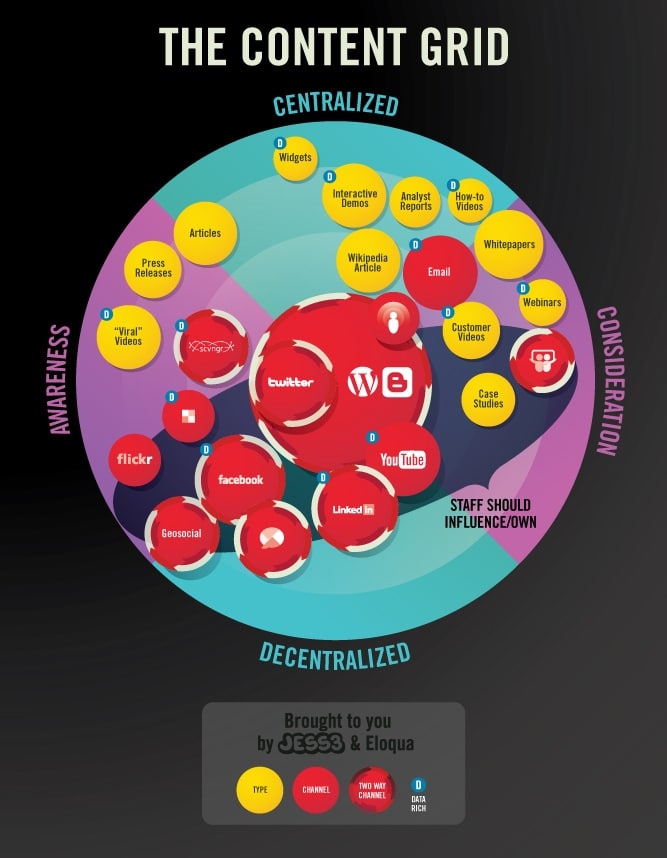
As an online business owner, you must make sure to attract and keep as much people to your website as possible. Good quality contents can help you to do that. The importance of content writing can be felt while you want to make an impression on your expected customer while making sure that you come out as a confident person with your product or services. You must hire professional content writers for your website if you have no experience of it.
Content Marketing Vs Traditional Advertising

Section 1: Content Planning
Function and Purpose of a Website
Learn the real function and purpose a website which is very crucial and the foundation of your web strategy and digital marketing efforts.

To fit into the shoes of a web content writer, it is imperative that you understand what websites are all about. We’re not going into discussions like what makes a great website or what drives quality traffic into a web portal. In the scope of this topic, let us look at some of the purposes that a website is expected to fulfill.
Because you will be writing for websites that need to sell or promote ideas, products or services through the power of the Internet, you must know what you need to have at the back of your mind. Unless you have the right perspective to write, your copy will not blend in seamlessly with what the website has been created to achieve.
Firstly, the website is a marketing tool in itself, not a product that Internet marketers promote through search engine optimization and other methods. A web content writer must generate copies for the website with a view to sell products and services. For non-profit websites, the purpose would be to disseminate information and build up opinion. The writing must aim at meeting this purpose head-on. Visitors who come to the website through any channel whatsoever must be convinced about the points that you put forward through your words.
Secondly, most commercial websites look for a reaction from the viewers in terms of clicks on web links provided on the web pages. On clicking, the visitor can be taken forward to the Products/Services web page or directly to the option to buy what they want. As a web content writer, you must focus on this function of a website. Copies for web pages are useless if they make for good reading only. If you fail to drive the visitor into making clicks and checking out other pages, if not buying the product/services, your writing is not what the website is looking for.
Thirdly, information dissemination is an integral part of creating a website. Many would-be buyers visit websites to check out specific details. If they like what they read, they will be tempted to make a purchase. That is why you must provide relevant information in an interesting format. Do not expect the visitor to browse through paragraphs of web content to look for a single numerical figure! How you serve this function of a website will determine how competent you are as a web content writer. The best way to approach this issue is to think like a web visitor. How would you like to take in the information?
Fourthly, the purpose of a website is grossly defeated if the visitor does not come back. Through your writing, you have to build up a steady base of loyal visitors who check the website for regular updates and information. Quality writing, coupled with sensible sprinkling of data and statistics, will help you get visitors to fall back on your website when they need any information or purchases in your domain of business.
Decoding Reader Psychology in Content Writing
Learn the facts about decoding reader psychology in content writing. A reader browsing through web content has a different approach.

Tomes have been written by scores of literary critics on how to understand the psychology of the reader. Authors across the ages have debated and discussed the issue. Their aim was to evolve a method on knowing what the reader wants to read or what they are going to enjoy reading. The Internet has trashed all their findings. Reading a printed paper, like a book or a document, is very different from reading on a computer screen, tablet or the mobile phone. A reader browsing through web content on the computer will have a different approach as opposed to someone reading the same content on a paper or book.
As a web content writer you have to know what your reader wants to see on the computer screen before he decides to read what you have written. The first point that you must keep in your mind is that an Internet reader has plenty of options to choose from. There are dozens of websites catering to the same domain and are equipped to provide the same information to your reader. Why must he then read web pages that you write? The answer is that you have to grab the reader’s attention very early and very fast. The headline or the very first line of your copy must be able to achieve that attention.
The second point is to keep the reader interested throughout the copy that you write. Distractions are always popping around when someone is reading on the Internet. The chat window may buzz up or there may be an email coming in or other diversions that wean away a reader from your web page. Unless you have written your copy in a gripping narrative, you will lose out on the reader’s focus. Use snazzy lines and bullet points generously. Another technique to keep the reader interested is to use a conversational style. No one likes to read lines that imitate a textbook.
The trickiest point of all is to convince the reader into what you are trying to convey through the web content. Other than the fact that there are other websites trying to do the same, marketing copies written exclusively to sell products or services usually ring false with an online reader. You have to draw a line that balances your commercial side of the web page with the aesthetic quality of your writing.
One must not outdo the other. A brilliantly written web page with little sales thrust will leave the reader happy but your business will suffer. Similarly, too much of a sales thrust will repel the reader, and make your web page look like your business is on an ego trip.
Web content writers must always keep in mind that online readers do not like being led on a labyrinthine chase to unearth the message you are trying to convey. Readers like relevant points stated in a straightforward manner. Stick to the basics of lucid writing and you will do just fine!
Goal of a Website: Writer’s Contribution
Learn the goal of a website from writer’s perspective. The job of a web content writer is contained in the goal of a website. Every website is created with a reason in mind.

The job of a web content writer is contained in the goal of a website. Every website is created with a reason in mind. Some are built to provide information, others for online lead generation while some others help customers to make purchases through the Internet. The kind of writing that you crank out for your website depends largely on what you want to convey. A successful web content writer is never confused or vague about the aim of the website he is writing for. In such cases, it makes more sense to tap information sources and find out what you are writing for.
Let us take up how you must write web pages when your client or the owner of the website is looking to provide information to online visitors. Such websites do not sell any product or service, but as a writer you can take it that you are selling information. Visitors to your website will refer to your web pages as credible sources of online information if you provide them accurate analysis and authentic data.
There are numerous sources from where an online visitor can parse information. But every netizen knows that online information and statistics are not always credible, unless they are pulled off reputed websites. As a writer, you must get your website into this trust zone of the online visitor.
The most popular goal of websites across the world is to generate online leads. The general view is that online users look up for details about products and services on the Internet. That is why businesses hire search engine optimization experts and fine-tune their websites for better online visibility. Their task is to get online visitors to the website. The job of the web content writer is to keep these visitors engaged and interested. If they like what they read, they will check up other web pages.
Finally, when they are convinced about the product or service that your website wants to sell, they will make a purchase. As a web content writer, you have to be fluid about mixing the marketing message with specific information. An overdose of either is undesirable.
Another goal of a website is to facilitate online payments for customers. Usually this goal is secondary to the purpose of generating leads. Web content writers must understand that people are wary about making online payments because of several inhibitions. You have to present your case by choosing your words carefully. Online payments must be hassle-free.
The technicians of the website will have to take care of that. What you need to do is guide the online customers through the process. Address them with easy-to-follow instructions. It is better to guide them in small steps instead of packing in all the directions in one paragraph.
In your career as a web content writer, you have to write for all these reasons and many more. How you put down one hat to pick up another decides your mettle as a writer!
Section 2: Content Writing (Body Content)
Writing a Compelling Web Page
Learn how to write a compelling web page. The secrets of writing stunning web pages. Fundamentals, tips & tricks of web copy-writing.
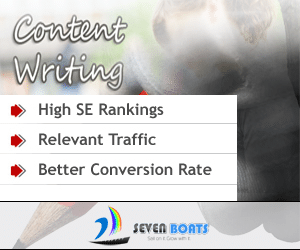
For a web content writer, the body of a web page is the most important aspect of all. This is more crucial than writing articles and blogs or even press releases. The reason is simple. You write other forms of web content to promote your website.
Finally, when your targeted online visitors come to the website, you cannot afford to treat them with anything but the best content that you can come up with. Failure to do so would mean that these visitors will shy away from your website, along with other promotional and marketing content that you write. The body of a web page, especially the home page, is the litmus test for any web content writer.
The first point that you need to focus on is to keep things straight and precise. Online readers have a short attention span and even shorter time to devote to a web page, what with so many online portals vying for their attention. A web content writer has to get to the point quickly. Write your copy with relevant details, without sticking to a point for longer periods of time.
The better you are at changing tracks, the more interested your reader will be. At the same time, keep your copy furnished with required data and information. Writing precise lines does not mean leaving out required and valid points.
Secondly, rely on short lines. Long, winding sentences may have high literary value in books but on the web page, the mechanics are very different. Write to get your point across without taking refuge in a sack of unnecessary words. Because they are reading your work on the computer screen, they will be distracted by other occupations like checking emails, or chatting with friends.
Online readers hate having to go through a labyrinth of words to find out what the actual message is. It is always a wiser idea to give them that message point blank. It saves their time. And yours!
The third point to bear in mind is that you must have control over your tone of writing. Websites have a purpose of their own. If your copy is intended to sell, you must not be blatant about it. No one likes to buy something that is being sold in a desperate way. That makes customers suspicious that something might be wrong with the product/service or the seller. Blend in your marketing lines effortlessly.
There is no better writing style than the one which strikes a balance between hard-core selling and information dissemination. Educate the reader on your product/service so that the customer can decide for himself whether he wants to buy or not. When you provide that choice and information to the customer, then you are trusted as a seller!
Finally, be convinced about what you want the customer to be convinced about. If you are vague and clueless as a writer, your copy will smack of it. Always research before you hit the keyboard. Collect the data and present them in a way that you will enjoy yourself as a reader. That is the best way to know what to include and what to edit out in your final draft.
War of Words: Web Writer’s Choice

As a writer and a person of letters, words are your best friends. There is no denying the fact that to be a competitive writer you need a deep stock of words. In web content writing, the need for a sound vocabulary is even more pronounced because you have to write on a similar topic most of the times.
You will need to write different pages of a website dealing with the same domain. So, your usage of words cannot afford to become repetitive. At the same time, you have to be aware that you are not using words that do not mean anything for the common readers.
The Internet is a medium for everyone. You cannot expect every reader to be distinguished and erudite. Your copy must hold the attention of every reader. Let’s look at some of the ways in which you can do that through the power of your words. To begin with, try not to use words that are long and complicated.
For example, instead of using ‘notwithstanding’, use ‘despite’. The key to a good web content copy is to ensure that your readers are not turned away by the weight of your prose. Write in a simple style, with plain and common words.
By common one does not mean cliché. Clichés are a writer’s known enemy and make the copy monotonous. The more original in thought and words your copy is, the better an impression it makes on the reader. You have to understand that readers on the Internet check out several web pages in one session of surfing.
When they are looking for information, online visitors take tours of numerous websites before making up their mind about a particular product or service. They will sample what you are trying to sell only if your writing breaks through this clutter of information that the reader is processing in the mind. Judicious choice of words will help you attain that.
Web content writers often face the dilemma of using words that sound good but do not fit into the context. You cannot afford to allow your aesthetic sense of the language to take precedence over the ideas that you want to convey. Use words that are relevant to the topic of discussion. Do not try to fit in good-sounding words that do not make sense.
Always remember that readers are going through your copy for information about something that interests them. They are not in this to find out how good a writer you are. In fact, your capability as a writer is proved in providing them with what they want. The words you use must complement this goal. Words make or break a writer. The same goes for web content writing as well. If a reader stumbles on the words that you have strewn in his way, he will bid goodbye to your web page and never return! So choose your cards well and make them suit the occasion.
Building Up Web Page Content
Learn how to build up web page content. In the field of web content writing, there’s one old English proverb that you have to keep in mind: Morning shows the day!

In the field of web content writing, there’s one old English proverb that you have to keep in mind: Morning shows the day! Readers or online visitors who surf through websites are short on time and low on attention.
As a writer, your toughest job is to grab the attention of the reader. A snazzy first line or an innovative headline will be a huge help in this matter. However, grabbing the reader’s attention is just the half battle won. You have a task on your hands that is equally challenging, if not more. You have to write your web page copy in a way that carries the reader’s interest throughout.
It is true that as a web content writer writing for a variety of readers, you cannot be sure how your copy will be perceived across the board. Some will like it and there will be those who are not so impressed. That is a fact that every writer has to live with. What you have to do is ensure that your reader gets the relevant information that he’s looking for.
Online visitors want your writing to get to the point without wasting words on building up a climax. They want their data and statistics instantly. You have to cater to this instant gratification syndrome if you want your writing to make an impact on websites. Here’s how you can do it!
In the world of print journalism, reporters and journalists use a format of writing news stories. It is commonly known as the ‘inverted pyramid’ style. The crux of this approach is to state the most important points at the very beginning of a report. That way people can get the information without having to dig deep for it! The same principle can be followed in web content writing.
You have to make full use of the area on the computer screen that is technically known as ‘above the fold’. This is the space that an online visitor can see without scrolling down. The writing that fits into this space has to be top notch. Once you get that, readers will surely scroll down and read the entire content.
Another advantage of this method is that readers who want to leave the web page after reading the first paragraph of your writing can do without denting the purpose of creating the web page. If the reader leaves before registering some information from your web page, that is a disappointment for you as a writer.
But if the reader get to read the cream of your web page before he shuts down his browser, your task is done! The appeal of your writing and the information that he takes along will ensure that the person will come back to read the rest at a convenient time later on. So, you have to make sure that when you are writing a web page, you are stating the most important points first before moving on to the others.
Section 3: Writing Headings, Slogans & making content viral
How To Write Headlines that Matter
Learn how to write headlines that matter. Web copy writing tips and tricks to write compelling article headlines. Reflect on your experience of reading newspapers..

Reflect on your experience of reading newspapers. Any broadsheet will contain scores of news items. But you read only a few of them. How do you pick what you will read from all these varied choices? You go by the headlines! This sort of reader behavior is synonymous with online readers as well.
Headlines are often the only reason why a reader would go through one copy and reject the other. It creates the most lasting impression on online visitors. Weak headlines lose the reader well before the visitor starts reading the copy that you have written. Web content writers cannot go slack on headlines.
There are different kinds of headlines, depending on the approach you want to take and the purpose of your web copy. Some of these different formats of headlines are listed below:
Different types of content headlines
- The Question: This is a tested headline stance that arouses the curiosity of the reader. In this, your headline is framed like a question. Don’t make it too inquisitive as that might offend or repel the reader. Frame questions that the reader would feel compelled to find answers to. Example: Are burgers as healthy as you think?
- The Shock Value: online readers go through numerous web pages while looking for information. Headlines that shock them make an instant hit. Readers find such headlines breaking through the clutter, and sometimes boredom, of so many web pages that a search engine might throw up. Example: Your emails are being read!
- The Direct Appeal: There is no denying the power of a direct marketing message to grab attention and eyeballs. Readers do not care for much of subtlety when the product or service that they are looking for falls in the instant gratification slot. Similarly, if your website is offering a huge discount, announce it on the headline unabashedly. Example: Get 40% discount on Photo Retouching
- The Command: Online readers are known to be passive unless goaded into action. Do it with your command headline! This is the best way to make readers click on your web links or check out other associated web pages. It also calls the reader to action. Use a strong verb at the start of the headline to make maximum impact. Example: Paint your House Today
- The News: The domain that you are writing for might announce some news or updates for your online readers. Such copies must always have a news headlines. This headline is like an alert that everyone associated with your field of work must know. The fact that the news is not fiction or a marketing gimmick adds to the credibility of this headline. Example: Online Products Business Increases by 12% in 2012
- The How-to: Online readers want to read up on web pages to know the process of certain tasks. Writing how-to headlines is comparatively easy but you must keep in mind to use simple words to construct it. Example: How to Write Snazzy Copies
Read about how to write most powerful SEO title tags with power words & sentiment analysis.
The ABC of Bullet Points
Learn the ABC of bullet points in web content writing. Relevance of bullet points in better web copy writing.

What started off as a feature to highlight important points and drive them home, is now a legitimate web content writing tool. Web pages are almost sure to have bullet points if they are looking to give the reader a quick glance at the information. Through bullet points, you can explain your point quickly and move on to the next one.
At the same time, bullet points allow the reader to check through the mainstays of your copy without having to read through it all again. The trick that web content writers need to learn is how to make use of these bullet points most effectively. Here are some bullet points to help you grasp the trick:
- Bits and Pieces: Information overload is a common problem for readers. Web content writers may go overboard and cram the copy with too much information. That becomes a problem for readers because they are unable to retain most of it. It is also a losing proposition for the writer. It would be much better if you use bullet points and break up the large chunks of information into small pieces. This is more effective for online readers
- Highlight: Bullet points are used to highlight the most important points in your web copy. As the saying goes, too much emphasis is no emphasis at all! Believe in this saying when writing web copies. Use bullet points judiciously and relevantly. Don’t break up points just for the sake of increasing the number of bullet points. Before crafting out bullet points, list the main points of your copy
- Brevity: The content against a bullet point cannot go on forever! You have to edit them out and keep them short. If you are looking to list only some technical points, do away with the explanations. If you look to explain a little against a particular bullet point (as in this copy), keep them short and relevant. As soon as you feel that you are cramping in two different topics into one bullet point, hit ‘Enter’ and write the next
- Crux: Jot down the crux of your web copy in bullet points. That will enable readers with little time on their hands to browse through the points and know what your content is about. If the points interest them, they will scroll down and read your copy. Listing the main points also gives the reader a list for instant reference.
- Symmetry: Keep your bullet points of equal length in terms of lines and words. That gives a sense of symmetry to the reader’s eyes. It looks odd when your bullet point lengths vary in their size. For example, a bullet point of a single line is best not followed by one of 5 lines. Of course, the copy and relevancy will determine the length, but it’s worthwhile to keep this point in mind while construction bullets.
The Reasons for Writing Subheadings
Know the reasons behind writing subheadings in web copy-writing. Advantages of using subheadings, better Web copy writing tips, tricks & more.

Every web content writer is aware that online readers scan web pages instead of reading them thoroughly. The readers go through the content quickly and pick up the relevant words and phrases that contain the information they are looking for. So, as a writer you can expect online visitors to browse through your work in some seconds!
You can do little about this tendency of the readers. What you can do is attune your writing style and use of embellishments in a way that gets your message through without stretching the fragile attention of the readers. Just like you will do justice to your content with the use of smart headlines, the use of subheadings will offer you purchase as well.
Why Subheadings?
Why must you write subheadings in your web content copy? There are many advantages of using subheadings and the most basic of them stems from the reader psychology explained above. Because the readers are scanning through your content, subheadings help them find what they want, even if they are reluctant to read through the entire content.
They can quickly find what they are looking for, read the information you have provided and move on. If they are interested in reading beyond, your web copy is on their screen anyway.
Sometimes the reader is informed about much of the web copy that you have written. It may be that he wants to know only a portion of the web copy to fulfill what he is looking for. Subheads allow him to get to that elusive point quickly. This kind of content reading is very prevalent on the Internet. Online readers are repelled by paragraphs lined up one after another without any subhead to lead the way.
When the reader scrolls down, he is easily fatigued at the sight of the effort he needs to put in to find what he’s after. Subheadings reduce this sense of fatigue immediately because you have already broken up your content in digestible and accessible subparts. This is a smart way of informing online readers without taxing their minds unnecessarily.
SEO Advantage
Subheadings provide you with an opportunity to plug in keywords organically. Web content writers are often faced with the difficult task of inserting keywords without disturbing the flow of content. That is not always possible in the body of the content. Subheadings can be exploited for this purpose. Search engines find it easier to index content when they come across subheadings that make use of keywords deftly.
While composing subheadings, try to use the keywords towards the beginning. Other than favoring the search engine crawlers, online readers scanning through your copy will also find these words popping up and helping them to locate information.
Writing quality subheadings is an advantage for content that is shared on social media platforms. As you know, the search algorithms of social media networks have a similar mechanism as search engines. When you write keyword-rich subheadings, you are likely to bag the top ranks for relevant searches. That will help your web page get more readers.
Remember always that while writing bullet points treat each one like a headline. That will help you construct meaningful, efficient bullet points in your web copy.
Tips to write magnetic content

All content writers want netizens to read and love their writing. There is no harm in thinking along those lines, provided you know what it takes to achieve that! Web content writing follows a different set of techniques that you might not be conversant with.
So, if you have written excellent essays in high school and think that web content will be just a walk in the park, it’s time for a reality check! Web content writers have to survive under stiff competition from other websites in the same domain. If your content is not interesting enough, the reader will shut down that browser tab and buzz off to another website.
What are the points that you need to keep in mind? To start with, do not take your readers out for a long ride before you break your core information to them. Readers on the Internet believe in instant gratification when it comes to data. No reader would enjoy reading through your introductory lines and rhetoric to get to the information he is looking for!
The more blatant you are in parting with the information, the better off you are as a content writer. Keep the factor of brevity in mind and sort out your material according to relevancy. If you are ruthless in editing words and phrases that look redundant, you will be able to crank out a killer web copy.
Web content is best written in an active, conversational style. The reader on the other side of the computer screen is connecting with your writing through a digital medium. Do you speak to people on the cell phone in a passive voice? Follow the same tenet in web content writing. A key purpose of your content is to urge the reader into some sort of action.
It could be a click on a web link or a response to a survey. The use of active verbs will be able to bring about that sense of urgency in the reader. Passive writing will also make your copy obese and verbose. Both have the potential to kill an otherwise competent content writing.
As a web content writer looking to plug in a marketing message here and there, you have to look for opportunities to make the reader think and respond. Provoking the reader through intelligent arguments and smart writing will be beneficial for the web copy. Don’t try to solve or answer the problems that you have raised in your copy when your purpose is to bring out a response in the reader.
The ‘call of action’ must be subtly wrapped so that the readers do not think that you are desperate for a click. While you balance these threads in your mind, keep an eye on the most clichéd of all web content mistakes: using clichés! At the same time, get rid of soppy adjectives. They don’t work on online buyers. As long as you have a direct approach, your web copy is bound to attract readers.
Improve Creativity in Web Content Writing
Learn how to improve creativity in web content writing – You have to be ready to think outside the box. Do not remain confined to the established boundaries.

Web content writing has its limitations. You cannot go beyond a certain framework when you are drafting a web page. The parameters are there for you in terms of information and expression. This may make writers feel that there is little creativity involved in the process of web content writing.
That notion is far from ground reality. As a web content writer, your challenges are different to those of a journalist or fiction writer. While constantly engaging the reader in your writing, you have to write a web page that makes sense and also imparts information. That task itself is a creative one!
However, the hard fact is that very few web content writers try to hone their creativity. A major reason for this regressive thinking is that web content writers are scared to introduce a new idea or concept. Writers usually pick up information and material from established sources and write in the mold that is recognized and appreciated.
You have to be ready to think outside the box. Do not remain confined to the established boundaries. A good way to do that is to let go of your evaluation when you are writing something. Write out what you are thinking and then sit down to edit the content. That way, you are not stifling your creativity before it comes out on paper.
The Internet is a throbbing network of information. There is no end to the material that you can dig out on any given subject. Your task is to sift through this heap of statistics and data. Write only the relevant chunks. You are a writer not an assimilator. Your success lies in packing up the information in an interesting and engaging format.
Too much information will bore your reader. On the other hand, when you compile the same ideas from a reader’s perspective, your web copy will be better appreciated. Keep in mind to present this information in a direct, unambiguous way. You have to state the obvious when it comes to web content writing. Subtlety is not of much value for a web content writer.
Web content writers cannot afford to be low on confidence. Creativity is affected grossly if you are not sure about your writing assignment. You have to conduct a thorough research before you start writing. Prepare yourself by reading competing websites and related information. Look at how other writers are presenting facts and figures.
Learn from what you observe and then apply the positives to your own writing. That will improve your own creativity and confidence. Another important quality in a creative content writer is to handle criticism. Do not be afraid to come under scathing criticism from netizens and readers.
Every idea needs its own gestation period. You will be haunted by doubt during this period. The same goes for web content writers. This is the stage when you have to let your creativity and skill do the job. Be convinced about your work and that will reflect in your writing.
Pointers on Web Content Writing Secrets [PDF]
Viral Content [PDF]
Read about the basics of getting your content viral
Section 4: Keywords in Content Writing
Role of Keywords in Web Content Writing
Learn about the role of keywords in web content writing. Keywords are important but should they dominate your content writing? Know the right use of keywords.

In every form of writing, the words must reach the reader to be read and appreciated. You read a news story by buying a newspaper or checking it online, you read a book in a similar manner. When it comes to web content, the writer must find his reader and not the other way around. The reader is not aware of what you are writing and posting on the Internet.
It is only when they search through particular words and phrases that they come across your content, be it blog posts, articles or web pages. Every web content writer knows that these words used in the search engine boxes are called keywords.
As soon as you take up web content writing, the role of keywords will become a throbbing presence. The key to successfully combating this challenge is to not let the use of keywords become more important than the content that you are writing. Keywords are like the frame of a picture. You have got to paint well, otherwise the frame is not going to take you places!
In other words, your web content must have substance and must be engaging. Focusing too much on keywords will distract your writing from this primary goal. Write a good copy first, with sharp attention to the tents of content writing. The keywords come in later.
Let’s look at how keywords help your cause before proceeding any further on this discussion. Online searches pick up keywords from your content and generate search results. Using keywords smartly and organically will ensure that your content comes up on the top of the search results.
It is a common psychology among netizens that they think that the top results are also the best results. That is why the number of clicks is the highest on the top three search results. Your content will benefit immensely if you grab these slots. More visitors to your content page means more readers and in turn, more customers. This is the simple reason why the use of keywords have pushed ahead to become a kind of parameter to judge good web content.
Now, if keywords are that important, why must you treat them as secondary? Web content writers face this dilemma when they are starting out as cub writers. The reason is that if you allow keywords to dictate the content and your writing, your output will be inferior. Though in terms of keyword usage your writing may rank high, the quality of your work will suffer.
So, despite getting better search engine ranks, you will achieve little because visitors (and subsequently, readers) will take away little from your poorly drafted web content. In fact, once they back off from your writing because of substandard writing, they are most likely never to come back! That is a price that no writer can afford to pay. It’s a much better idea to write quality web content and use keywords as per relevancy.
Use of Keywords in Web Content Headings
Keywords are words or phrases, that online users key into the search box to look for information.Get how to use keywords for content headings.

As a web content writer, you have to be prepared to come up with quality headings. Just as in a newspaper, readers are attracted to a web copy if the heading is interesting. There is another reason why headings should be written in an interesting format. Web copies are usually pulled and indexed by search engine crawlers with the help of keywords.
As you know, keywords are those words or phrases, that online users key into the search box to look for information and material. The content that you write must contain a liberal use of these keywords so that readers find your web copy on the top few search results.
Other than in the body of the content, you have to use these keywords in your headings as well. The chances of your content being indexed by search engines favorably increase manifold times when your heading contains the main keyword. Search engine optimization (SEO) experts will give you a list of keywords that are trending among online users.
These keywords are domain specific and have different degrees of competition. The entire list of keywords can be divided into two main groups: primary keywords and secondary or tertiary keywords. Use these primary keywords in your headings to ensure that search engine algorithms can find your web content easily.
Other than the obvious reason of SEO advantage, there are other reasons why headings must contain the primary keywords. That reason draws from the psychology of the online users when they are checking up search engines for information. Users key in words and phrases which they think will bring up the relevant content that they are looking for.
In other words, the words or phrases that the user types in are what he’s actually looking for. When your headings contain the same words, the connection with the information seeker is instantaneous. Your web copy is immediately chosen over other web writings because the reader sights the same words in the heading as he had typed into the search box. He feels that your copy is the most relevant search result.
Make the use of keywords more effective in headings. Try to draft a heading that has the keywords at the very onset. That way, your online readers can find the keywords popping up into visibility range without having to look for it. This way of using keywords also has the SEO boost that we have discussed earlier. From a reader’s point of view, use of keywords in the headings help them to sort the numerous web results that are thrown up on every search query.
If you use your keywords relevantly, readers will appreciate your effort. A tip for budding content writers: do not try to force in a keyword into the heading. Check if the keyword is relevant to the web copy that you have written. That is why it is always a wise idea to draft a heading after you write the entire content page.
The Relevance of Keyword Density in Web Content
Learn the relevance of keyword density in web content writing. Tips and how to guidelines to maintain proper keyword density in copy writing.

For web content writers, the responsibility of using a requisite number of keywords in a web copy is immense. To many, especially SEO executives, failing to adhere to a strict code of keyword usage means inability to write a page of competent content! This idea of using a generous number of keywords in web content writing has become an influential guideline for many budding writers.
The truth is that using keywords is not as big a deal as writing superior content. If you fail to deliver in terms of engaging and interesting content, the right number and use of keywords will not get you any benefits whatsoever.
What is this concept of keyword density that web content writers are so concerned about? On a very skeletal level, keyword density is the ratio of the number of keywords you are using, both primary and tertiary, as opposed to the total number of words in the web copy.
So, if you are using 4 keywords in 100 words of content, your keyword density is 4%. According to the traditional school of content writing, your web copy must hover somewhere between 0.6 to 1% in terms of keyword density. Going below this range will mean that you have written content that might not justify your effort and the cost borne by the company. Shooting above this limit would be considered as spam material by search engine crawlers.
Now, the problem is that search engine crawlers and algorithms have taken huge leaps of progress since this theory was in practice. Today, the search engine crawlers are more life-like than ever. They judge and index content from a human reader’s point of view. The algorithms are conversant with the use of synonyms and smart framing of sentences.
So, as a web content writer, you are less likely to fool the crawlers by using generous amounts of keywords in a veiled way. This kind of indexing is termed as Latent Semantic Indexing (LSI). This takes away the notion that you have to pack in a certain number of keywords to be favorably indexed. The focus has shifted to writing relevant content in order to grab those envious top search engine result slots.
This shifting of the onus to quality content being the primary factor and not keyword density has made life easier for web content writers! You need not be hassled by the burden of using a specific number of keywords in each paragraph anymore.
Instead, concentrate on writing a web copy that is worth reading. That does not mean that you will do away with the list of keywords completely! Use keywords judiciously and solely on terms of merit. Organically used keywords in the content will highlight your writing both for human readers and also search engine crawlers. Work on the natural flow of thought and express and let keyword density take a backseat. After all, we always say, content is king; not, keyword is king!
Section 5: Content Management
Be A More Productive Web Content Writer
Learn how to be a more productive web content writer. Better web content writing tips, copy writing tricks and more. Role of content writer.

The going for web content writers have become better and worse at the same time. Let me explain. You are better off as a web writer today than say a year ago because there are more avenues to get your writing read and appreciated. If blogs and articles were all that you had then, the social media boom has made it possible for more people to come across your content.
It has become worse because of the same reason! With more platforms to publish your writing, you have to be a prolific writer in order to cope up. When you could get away with writing just a blog post or an article on alternate days, a web writer today has to make room to draft Twitter updates as well!
That brings us to the question: how can you increase your productivity as a writer? Let us cancel out some of the stock responses to this question. For example, you cannot pump up your writing volume simply by writing more. This is not a mechanical task that you have to just put in effort and time to increase the production. Writing requires a frame of mind.
If you are not inspired or ready enough to write more content on a daily basis, you will end up producing drivel. That will do nothing for your website or your credibility as a writer. Readers do not want to read more blog posts and articles. They want to read quality writing. Being more productive as a writer usually means increasing the volume of quality writing.
Here are some steps that will help. Decide on a writing schedule. You will have to work out a daily routine that touches all the corners of your writing ambit. Draw up a list of content requirements that you have to fulfill. Then pencil in the time allotment for each of them. Preparing the groundwork to write is integral to increasing the number of web copies that you can deliver. In the field of commercial web writing, there is nothing called ‘writer’s block’!
For most writers who have a definite volume to live up to on a daily basis, chewing on the pen (or, more aptly, brooding over the keyboard!) is a luxury that they cannot afford. For web writers, the process of writing is more of practice and habit. Choose a time when you love to write. Be at your desk at that time religiously.
No writer can sustain the exhalation of creative expression for long without inhaling some in return. You will improve immensely as a writer when you read the works of others. Check out the websites that are famed for their quality content. Read. Note the expressions and usage of language. Learn how experienced writers are approaching their subject. Love the process of writing. Also, gather more knowledge and study latest trends on domains that you usually write about. That is the best way to become a more prolific writer.
A Writer’s Identity: The Unique Voice

Writers are as good as their individual identities. No writer can be successful in trying to imitate or reproduce the linguistic style or method of another writer. The same can be said of web content writers, though many prefer to follow writers who are more successful on the Internet.
Whether you are a web writer or blogger, unless you create a unique voice for yourself, you cannot expect to be heard. There are numerous writers going through the motions every single day. They are writing standard copies for online readers. Then, how will your work stand out? The answer is that you have to create and develop your brand of writing.
How do you do that? Firstly, separate the two selves in your creative being: the writer and the editor. You will not be able to get into the groove as a smart-thinking web content writer if you are too concerned about the end result. Web writers have to think of many different aspects of writing. For example, you might get bogged down by the pressure to insert keywords.
Or, you might worry too much about making room for anchor text links to be placed on your phrases. Once you allow these secondary matters to dictate your writing, you will feel stifled. Instead, get into the flow and write the way you want to. Once you are done with the writing part, it’s time to put on your editor’s hat.
Web readers are repelled by writing that smells of sermons or lectures. You will quickly lose the interest of your reader if you get too preachy. Try to develop a conversational style. Be natural in selecting words and phrases. Write as you would talk to a friend. Of course, the tone of your writing has to be in sync with the project you are working on and the topic you have chosen.
You cannot afford to sound flippant in writing about serious issues. However, do not drop the easy tone of speaking with a fellow human being. That is your best guide to carving out a separate identity for yourself as a writer.
Since teenage, we are taught to write and frame sentences in a particular manner. You have to unlearn all of that as a web content writer! The Internet writing rules are flexible and varied. Your topic and subject dictates the construction of sentences and matters of syntax. Being too particular about conventions will work against your writing ability.
A wiser idea would be to write as you know the language. Be clear in your mind and the words will tumble out spontaneously. That is why writers who are transparent in their thoughts are able to achieve that same kind of clarity in their written words as well.
Finally, you have to feel comfortable about the subject you are writing about. If you feel unsure, put in extra amount of research. Your unique voice as a writer will remain choked as long as the information you are looking to share is not processed well in your own mind.
Web Writer’s Friend: Twitter!
Getting on Twitter and writing within the limitations of 140 characters (not words!) is not a writer’s dream. Twitter forces you to think in terms of using smaller words.

For most writers, updating status on Facebook or Tweeting is not a very healthy activity. In fact, writers look down upon the art of writing short, concise messages on Twitter. Their point of view is that writing skills are grossly undermined when you are drafting these updates and alerts.
They have a valid point here. Getting on Twitter and writing within the limitations of 140 characters (not words!) is not a writer’s dream. After all, any writer worth their keyboard wants an expansive document page to rain down their thoughts. Who would enjoy being scuttled to just a tiny rectangular box? In this line of thinking, you are missing out vital lessons as a writer! Here’s how.
Twitter is all about being precise and relevant. You cannot go beyond the specified limit of 140 characters. In other words, even if your thoughts spill over, you have to somehow cramp them in to fit into that box. That forces you to write accordingly.
You are not dealing in excess anymore. That is the core of online writing. You have to get to the point quickly. The more you weave yarns of words, the more you are allowing your reader to get distracted. You cannot afford to do that because you run the risk of losing the online reader to other websites, content web pages and blogs. Hit the nail on the head when you are writing a web copy.
Secondly, Twitter forces you to think in terms of using smaller words so that you fit your sentence in 140 characters. You are compelled to rack your brains and come up with leaner lines. You cannot use words like ‘notwithstanding’ if you are Tweeting! The same principle needs to be followed in web content writing. Online readers are not reading your web page because they want to use your material for higher studies (unless you’re writing for such a project).
Usually, it is for commercial purposes that you are writing. So, readers are laymen who want to glance through the content quickly, look for words and phrases that match what is on their mind and get it done with. Give them easy words, shorter sentences and clarity of thought.
Think that’s all Twitter can teach you? It’s not just web writing that Tweeting brushes up for you! You can pick up a trick or two about editing as well. Because 140 characters are all you get, the editor in you has a full-time job when you are on Twitter. You have to cut out the frills and chop off phrases that look redundant. Apply these skills in web writing.
It is a common fallacy that the length of the content is a factor in online reading. What matters is what you have written. Readers will go through a long web page packed with writing if they find it engaging. Brush up your editing skills and throw out any line that you think is looking out of place.
Section 6: Content Marketing
How to get Killer Content Ideas [Infographic]
Content is King that we all know but how to get killer content ideas for your websites? We have recently come up with this infographic to highlight few killer content ideas that would come very handy to create compelling content when you don’t have any clue or having a writer’s block. This content writing tips will help you to create excellent viral content without actually creating it. Web content writing is an art and you must be smart! Check out our killer content ideas infographic below.
Source: 7boats
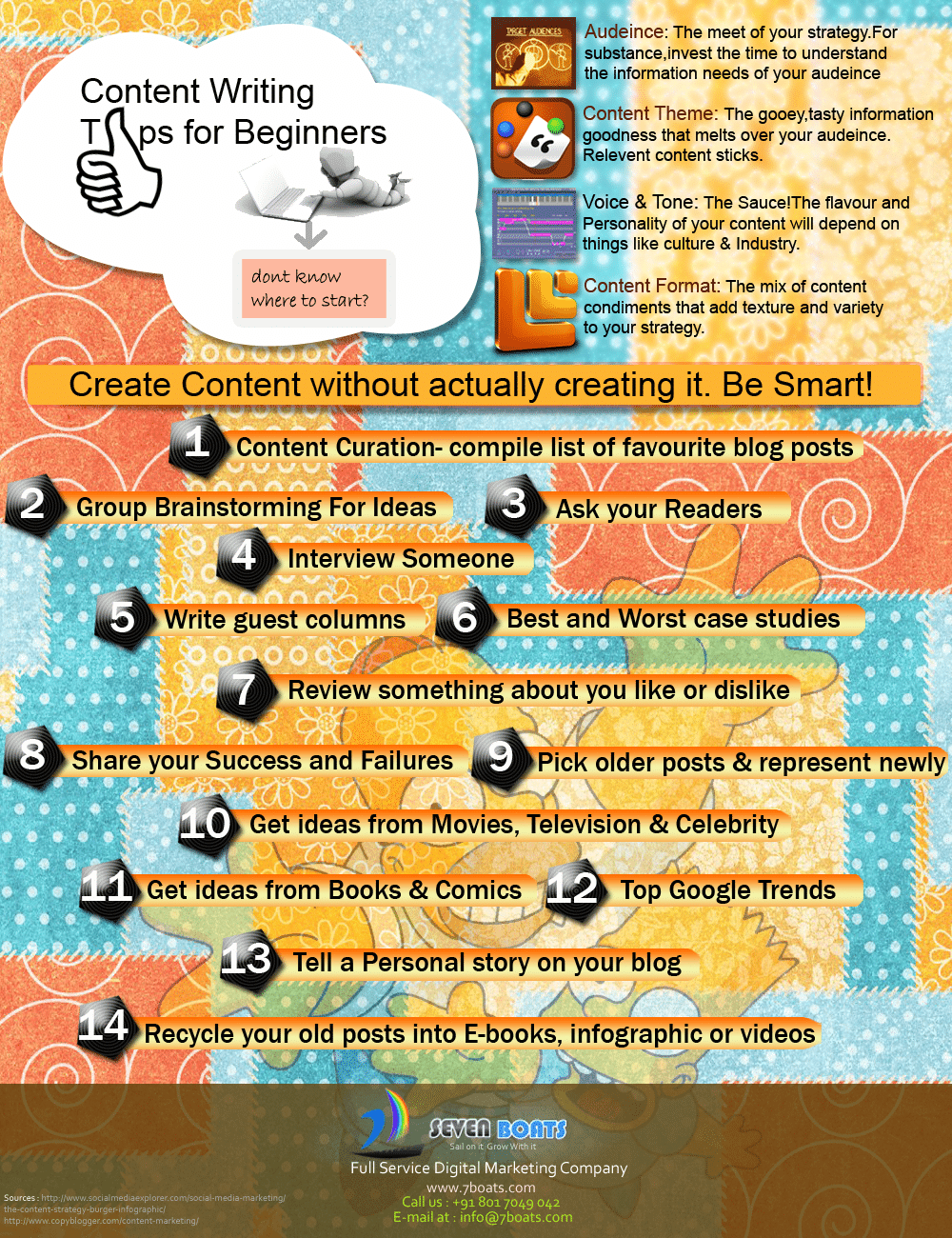
Get Rid of Boring Blog Content
Learn how to get rid of boring blog content. Tips to create interesting content for your blog or website. Compelling blog content writing techniques.

Blogs are in hype; especially after the launch of Google Panda updates, marketers are using blogs to provide the free flow of fresh and unique content on a regular basis. In fact, blog content marketing has been an optimal strategy for many websites for building their long-term success.
Rather than enhancing results from third-party sources, content marketing through blogs relies on what you are creating. Thus, the quality of your blog content should be impeccable, as only interesting and succinct can help you to grab the attention of the readers. Moreover, such content is more likely to get shared by readers and can be used as a sales pitch.
But the question here is why to create a blog in the very first place? Is it only to add fresh content? Or is there any other reason behind this strategy?
Of course, fresh content is an important aspect of blog content but there is another factor as well motivating website owners to add blogs. It is the social mentions. All blogs come with the social share features, using which readers can share the content on major social media sites including Facebook, Twitter, LinkedIn, Google+, Dig, Delicious, and StumbleUpon.
Every site owner assumes that their readers will mention their blog post on the social sharing sites, popularizing their content (read website). And this indeed is the normal custom, provided the content is intriguing enough to impress them. So the key here is to create interesting and intriguing content for your blogs. This, unfortunately, is easier said than done.
The theoretical implementation may sound too simple – create interesting content, put your keywords strategically, add social sharing buttons, and let the readers share them with the world. It is the practical implementation, however, that you need to think over. Why would the readers share them in the very beginning, unless you give them something that’s worth their time and effort? Or, let’s put it this way – why would you share someone’s content? How to generate content ideas that your audience will love?
For me, I will only share content if it answers my queries, add value to it and ensures me that my online contacts out there would like to read it as well and will find it helpful. Honestly, the word “LIKE” has more significance than you think it has. The world of social media, especially Facebook, has a lot to do with the word “Like”; yes, I am talking about the like button.
When I am liking or sharing a link, it means I am actually recommending others to read it. Thus, it involves my reputation as well. Would you recommend something to your friends if you were not sure it is worth their time? It’s more likely you won’t as it may jeopardize your online reputation.
Thus, it is essential to understand what interests your readers while creating content for your blog, and of course, make it a little intriguing to grab their attention.
Tips to Write Interesting Blog Content
Tips to write interesting blog content – How to write compelling content for your blog? Know the foundation of writing interesting blog content.
know your audience
Your first step to write interesting blog content is to know your audience. This will help you to understand what interests your readers. In fact, selecting a topic becomes easier if you are aware of the readers’ requirements. Just be strategic and do a little research. Search for some industry specific blogs and articles and you can get an idea what people are reading. But before deciding on a particular topic, consider what the excitement factor of the content is. What would people read it in the first place?
subject you are writing about
In general, the excitement factor depends on the subject you are writing about. It can introduce them to a whole new opportunity or concept, add value to their knowledge experience, or help them to solve an existing problem. In fact, a little creativity can help you go long here. The key here is to address the need of your audience. For example, you can create some content about basic to-do-lists (something like this one), market trends, success stories, reviews, and so on.
maintaining credibility
One factor that you should never overlook while creating blog content is maintaining credibility. This is one of the fundamentals of content writing. Content with grammatical and spelling errors, improper sentence structures, and poor English lacks in credibility. Thus, your content should be free of such errors. Such errors will not only create a bad impression, but will also keep your readers from returning to your site. Worse still, a copy with such unforced errors is hardly likely to get shared or any social mentions.
improved interactions
Finally, you should focus more on improved interactions. In fact, inviting readers’ feedback is a great way to improve your content. Reader feedback will add new dimension to the content, not to mention the fresh and unique voices you can add to spice up the conversation. This will help to grab the interest of your audiences instantly.
Additionally, you too can learn from your reader’s experiences and knowledge. Improving interactions through readers’ feedback also ensures that you will have a good amount of returning visitors – people who are commenting on your blog post are likely to bookmark your site and will return to see others’ feedback.
Another benefit of interacting with readers is the social mentions. Returning visitors are more likely to share your blog content with their social networks.
How to generate content ideas that your audience will love?
Learn how to generate better content ideas that your visitors would love to read and share. How to guide for better content writing ideas.
Having good content is very important if you want to attract more people towards your website or blog. There can be many kinds of content that you can have in your page but to make people love those contents, you need to make sure that you have some worthy ones. Ideas are the sources for creativity but it’s not always possible to start you way with instant great ideas.
There are some effective ways that you can take to generate content ideas for your website or blog. Let me tell you about some of the most effective ways of them.
YouTube can really be a great source for content ideas.
It can help you in two ways. The first way is to write about some of the most visited YouTube videos. Post the video in your page and write about what you think of that video and what can someone learn from it.
You can also use different videos to have an idea of your own. There are many short movies and funny videos in YouTube which can give you ideas about new content that people will love. However, make sure that you don’t steal any idea from there. All you need is to generate an idea from different concepts.
Controversies are the best source for interesting content.
It also interest people to share their views which will make your content even more attractive to the visitors. People, who don’t even understand anything about politics, like the political controversies.
You will find plenty of them in newspapers or in online blogs. All you have to do is to share your views on controversial matters and ask for others to share their views about it. That will light a fire on your post and soon many people will visit the post to read and share their point of views.
The social networking sites like Facebook and Twitter are great places to get ideas for your content.
You can follow some communities to know what people are talking about mainly. That will get you ideas about what people like to read and see.
Research enough on those matters before starting to create the content.
You can also ask about good contents in Facebook and Twitter. Give people some content ideas to choose from and see what they like the best. That way you will know what they are interested of and make your content on that subject.
Books and movies are the best sources for creating contents.
However, writing reviews is not good enough as there are plenty of sites and blogs for that already. What you need to do is to twist things a bit. Take endings of famous books and movies to create alternative results of it. That will also give you plenty of chances to use creativity.
This will surely make people interested to read your post and to share their own alternative endings. Your posts will become more interesting and people will start to check out your posts daily.
Also use well blending of content in your website.
Put videos, infographic, slide-shows, interviews, question answers, Top-lists, audio, drawings, flowcharts, text content with well formatting and clear paragraphs. Make content scan-able.
Visit other related websites and read comments of other people there.
Take ideas and elaborate your own thoughts on those. Also try to put statistics, market research report etc to make your content more info-rich.
Still you need some more ideas? Then here is another great list on how to generate content ideas by Danny @ Copyblogger
How to use Twitter for content ideas

For web content writers, the desire to get prolific and crank out content by the dozens falls woefully short of expectations. Reason: the need to get hold of topics and raw material to write on! Ideas don’t drop down from the sky! You have to come up with ideas while you are on the job. That is easier said than done. What can you do when you have to publish content but have a blank document staring back at you? You try to surf through Twitter to avoid the obvious. Why not take ideas from Twitter?
Yes, this is no dream of the dolphin! You can actually do so! Just follow these tips of parsing content ideas from Twitter:
- Observe: Twitter is a simmering, and sometimes boiling and spilling over, cauldron of ideas, news, alerts, updates and everything in between! Why not dip your empty cup into this cauldron of ideas? Follow and observe the talking points on Twitter. What are people talking about and tweeting about? What are the burning issues that people of the world are concerned about? If they are in your alley, fire away! Come up with an interesting post and share it among these Twitter circles. Your post will get immediate attention!
- Trends: If you are too concerned about time spent in surfing and observing Twitter profiles, the next best solution is Twitter Trends. This is a list of trending topics that are being tweeted about. Study the trends and write on those issues.
- Retweets: Twitter has this great weapon to endorse the views of others: retweet. These hold special value for you as a writer as well. Retweets are the hallmarks of topics that have interested more users of Twitter. You can check out the retweets in your domain of interest and chalk out content ideas from them.
- Ask: What does it take to step into a discussion and ask questions? After all, social media is all about engaging in debates, discussions and interactions. Talk to people on Twitter and find out what interests them. Take part in discussions and share your views. The more you reach out and speak your voice, the more people are likely to air back their thoughts. That will be the perfect fodder for your content!
Related reading: Evergreen Content ideas
Infographic – What makes content go viral?
source: Problogger

Content Writing Tips for Beginners
Your visitors are visiting your site either for information (read solution) or for entertainment. Thus, it is essential to have interesting and quality content to attract more readers to your site, as for online marketing “Content is the King”. Even the search engine giant Google value fresh and unique content more than anything. But before moving into the tips part for writing quality contents, you need to understand why content is so important for your site.
Google as well as other search engines send web crawling bots or spiders to your site to collect information. This data help the search engines to build a searchable index, which provide the search results when users queries with relevant keywords or phrases. And you have a better chance of getting indexed by Google with a rich and informative (also unique these days) content. This only a brief concept and there is more to it.
Now that you have a fairly clear concept about the importance of content for a website, it’s time to focus on the content writing strategies. Though technicalities are essential for writing content for web, conceptualizing is most important. You should know “What to write”, how to present it will only follow.
While writing for your own blog or web site, you have the liberty to anything you want. However, it must be relevant to your niche. This is especially applicable while writing for business website. In such case, the focus should solely on topics that interest your customers and are relevant to your specific industry.
Also, writing for business website calls for concrete knowledge regarding the subject to make your content effective. For professional writers or those who want to joint this noble profession (no-pun included) it is hardly possible to have knowledge about every subject under the sun. The key here is thorough research.
Remember the purpose of your content is to help the customers in making purchasing decisions, thus make it informative. Using vague adjectives to praise your product or services will only make the customers skeptical.
Correct grammar is a must for content writing, though it often gets overlooked. Same goes for spellings, you can’t afford to publish a content with spelling mistakes or typos – it will kill your credibility. Format the article in such a way that readers have no problem in understanding the though.
Moving to the more technical parts of web content writing, give special emphasis to your keywords. Place them strategically in your content, while maintaining the recommended density. For keyword research, you can use various online tools like Google AdWords, Overture Keyword Selector Tool, and Worktracker or ubersuggest tool.
Selecting proper keywords and including strategically into your content is essential for improving your search engine rankings. Read more about writing for the webs for beginners
22 tips for compelling content creation – Infographic
Source – Copyblogger

Writing for the Webs for Beginners
Many believe (read wrongly believe) that writing for web is much different from writing for print. Generally, the rules applicable to make a good content for print are also valid for writing web content. Apart from the keyword density and a few other technical details, which indeed play an important role for web content, I hardly found any difference in these two forms of content.
Therefore, one who is aware of the basics of writing for prints should also be comfortable with web content writing. Also, I heard many arguing that web readers hardly read the entire article, as they are always in hurry. But this is also applicable for newspaper readers (unless you count those who have the entire day to scrutinize the newspaper). Thus, the key for both the form of writing is to dispense useful information.
So accept the fact that your readers (both web and newspaper readers) aren’t going to read the entire content. With this comes our first tip –
Limit the text
There is no-point writing 1000 word article if you value your (as well as other’s) time and effort, unless you have something really important and interesting to say. Though there is no arbitrary limit, it is advisable to keep the content above 600 words. As a writer your focus should be on creating a compelling content that would be sufficiently interesting for your readers. It can be 600 words or 25,000 words it does not matter if it is well structured, clear, relevant, informative & meaningful to your readers.
How Long Can Your Blog Post Be?

There will always be a raging debate on how ‘long’ your blog post should ideally be. Some writers prefer to keep it short and precise, while others want to delve deep into a topic and cover all the areas associated with it. Objectively speaking, there are two aspects that you must keep in mind when you draft a blog post: the readers and the search engine crawlers. To hit the right number of words in your blog post, you must blend the requirements of both these factors. Let us now look at what they demand from your post.
Search engines like the blog post to be longer in length. The reason is that you have to pack in a specific number of keywords in your post so as to satisfy the algorithms of Google. If you write a very short post, either you have to leave out important keywords or you might exceed the ideal keyword density.
There is also the factor that search engines hate content farming where a writer cranks out about 200 words of content packed heavily with keywords. Instead, search engines adore blog posts which are dealing with the topic in some detail. So, if you write about 600 -5000 words, you are in the safe zone. Depending on the depth of the topic you cover, it can go up to 25,000 words with proper structure, heading, sub headings , schema mark up & clear readable fonts.
Interpreting the requirements of the reader with regards to a blog post’s length is far more complicated! You cannot rule out the fact that most online readers are running against time. They like to sift through the post quickly to locate specific information. In the same vein, they would love to read information presented in the form of an engaging, entertaining content. So, it would be good to conclude that if you write about 600-5000 words of content in a blog post, your readers will not be intimidated.
Other than these generalized aspects, you must keep in mind that every blog post defines its own length. You need not adhere to these guidelines like laws carved in stone. Allow your writing to flow naturally but guard against irrelevant information. That will see you through. You must keep in mind that readers will appreciate if you explore the topic with in some detail but they will not be pleased to read about associated information in the same blog post if those are written in an unstructured non-appealing manner. Edit wisely.
Opt for shorter paragraphs
This too is applicable for both the form of content writing. Long paragraphs are obsolete even in newspapers and magazines. In fact, single-sentence paragraphs are widely used for print content as well as for web content. Apart from the technical reason of making it comfortable for the readers to move down the page, short paragraphs are easier to understand and absorb. As far as web content is concerned, using shorter paragraphs makes it easier for search engines to pick up the text.
Using heads and subheads
Rather than reading long sentences, web readers have a tendency of reading small bits of text. This form of writing is widely practiced in newspapers and magazines for ages. By using headings and subheadings, you allow readers to select information that interests them.
In fact, any good article (for both the media) follows the traditional form of writing – it always begins with a proper introduction or overview, while the rest of the themes are broken down into a few sub-themes followed by a conclusion. Subheadings allow your readers to explore only the part of the content they want to read, rather than reading the whole thing. Heading and subheadings work as lead for good web content.
Finally, put all your main information up front – The Inverted Pyramid Approach
This is basic for print content writing; journalists call this phenomenon “inverted pyramid.” Web users mostly scan articles so put all your key information at the top to give them a good overview about your article. And do us a favor; eliminate unnecessary jargon, adjectives, and adverbs only to increase your word-count.
Section 7: Content Writing & SEO
Role of Web Content Writing in SEO
Here are some points on how web content writing determines the SEO and search ranking .
What is Web content writing?

Web content writing means writing anything on a particular website to present the website in an attractive way. Web content writing enables a website to set up its identity in its particular field. The content is the life of a website. Without content a website is totally inanimate. A good content can take a particular website to sky high. At the same time a content can pull the website down to the hell. The promotion and development of a website largely depend on a good content.
Web content should be written in simple and lucid language that can be easily understood by the online readers. The target of web content writing is to fascinate the readers with your charming content. For that your don’t need to adopt pedantic style as you may do to write a book. What you need is to write with simple and crisp words so as to enable the readers to easily understand your message for what you are there.
What is SEO ?
SEO stands for search engine optimization. With the help of SEO one can find out his most desired information from the vast ocean of information on the internet. Without SEO the success of internet would go in vain. Every website tries to get its message delivered to the reader first. For that the website needs to stay at the top in search ranking. A website gets the preference of SEO when it fulfills all the criteria needed for SEO. There are some factors that determine the SEO.
Now the question is what is the most vital factor that enables a website to roam at the higher position in SEO search ranking. The answer is Content. Yes, content is the most vital factor responsible for SEO search ranking. Some points on how web content writing determines the SEO search ranking are given below:
Good content:
content is the soul of a website. Without content there is no existence of any website. Content can make or break a website. Being a good content writer one should write the content as per the need of the online readers. Online readers don’t have much patience to read thoroughly your content. Moreover, they often get distracted from the web pages due to other businesses like e-mailing, chatting, etc.
So you should write the way they can read and understand easily. To achieve this goal you have to use very simple and understandable words. The more the readers grasp the meaning your WebPages the more they cling to your websites. The popularity of your website will spread by leaps and bounds. It will enable your website to rank high in the search ranking.
Catchy Headline:
Before writing your content you should focus your mind on how attractive you can make the headline of your content. Your half work is done, if you are able to trap the readers with your catchy headline at a single glance. Then your readers will get interested to go deep in your content. Here lies your success in writing the content for your readers and it will automatically helps the website to get a higher position in the search ranking.
Maintaining the proper keyword density:
To maintain the top position in the search ranking you have to use the keywords properly proportionate to the total number of words used in the your content. It should be 0.6-1% of the total number of the words. Not more or less than that. And if you maintain this density of keywords you will find your website going high in SEO.
Uniqueness:
As a web content writer you should not copy from the other website. If you do so, the rank of your website will obviously go downward position. Moreover, you will be penalized for that by SEO.
This are some common points should always be maintained to retain the higher position in search ranking.
Section 8: Creating the Best Content Ever for Your Website
Know the basics of creating the best content for your website. Learn about the types of content that both your audience and Google will love .

Google has made it clearer than ever that they are watching the content on websites and rewarding those that have original content that is relevant to the subject of the site. Now it is important to make sure that all of the pages on your site contain unique articles and material that are user-friendly to the end visitor. When you keep this as your main goal there is no way that you can fail with any website you create. It will keep your visitors returning for more and will also keep Google happy at the same time.
How to create content
The best way to get the content for your site is to think as a visitor would. People are typing in the keyword to find your site but what are they really looking for? When you take out a pen and paper and actually list the things that your target market is searching for in a site, you just have to go ahead and provide this to them in many different forms.
Videos are great
Some people don’t like to read a lot of content and will quickly head off the site if there aren’t a lot of pictures or videos on it. By using videos you can get your message across in a clear and effective fashion that will keep a lot more viewers at your website for an extended period of time. The longer your visitors stay, the more likely they are to purchase something or to perform a requested action.
Images and pictures
Pictures help to make the written word come alive. They make your site look great and can add to the relevance of the content on it when the images and pictures are chosen wisely. Don’t underestimate the effect that photos, pictures and even simple images can have. An aesthetic site should be a part and parcel of the whole website content experience.
It doesn’t matter who writes it
If you aren’t a writer and have a hard time stringing words together you can hire a writer to do it for you. These people are called ghostwriters and when you purchase an article from them they give you the rights to call it your own. Don’t let the writing get you down – hire it out if you must. The important thing is to focus on getting quality content onto your site that makes both your visitors and Google happy.
Section 9: Top 5 Techniques for Prolific Content Writing
It is every writer’s dream to wake up in the morning and crank out as many words as possible. Here are the top 5 techniques for prolific content writing.

It is every writer’s dream to wake up in the morning and crank out as many words as possible! However, on sitting down at their computers, and spending about a couple of hours in the process of writing, they find that their output is woefully low. That is a reality for most web content writers. To take up this challenge head-on, here are the top 5 techniques for prolific content writing:
- Distractions: Kill your distractions ruthlessly. Shut off the digital distractions like online chat, emails and other alerts. As for the offline ones, segregate a writing zone for your work. Do not allow distractions like laundry, post deliveries or phone calls to cut through your writing mood.
- Plan: Keep your writing plan ready the day before. Crucial time is wasted hunting for topics or surfing for data online. Spend some time in research and put them on stand-by. When you sit down to write, get into the thick of things immediately.
- Freedom: If you want to write creative content, you must be prepared to waste some words in coming to the idea that you want to put across. Write freely and edit furiously. Do not be miserly about how much you write every day. Write what comes to your mind and that usually takes lesser time to finish.
- Errors: While writing, do not spend time going back and forth about spelling mistakes or grammatical errors. Weed out the typos during the editing phase and not when you are writing. If you find some errors or doubts in your data or stats, mark them out and come back for them later on.
- Jot: You can produce voluminous amount of writing every day only if you never run short of ideas. To keep the idea bank filled to the brim, carry a notebook around with you. Jot down ideas, sentences or concepts as you get them in your mind. Keep these jottings ready by your computer when you begin to write formally and draw generously from these idea cards.
Finally, your writing will get smoother with practice. Hit a certain number of words every day so that you are always in the practice.
Bring out the Prolific Writer in You
Being a prolific writer is the dream of every content writer! Here is how you can do that. Read more.

Being a prolific writer is the dream of every content writer! And why not! There are so many pages to be written every single day. Unless you are able to polish off content at a fast pace, you will not be able to keep pace with the times. Despite this growing need for writers to be prolific, there are very few who are actually able to achieve that. Why is it so hard for web content writers to not be prolific? A simple answer would be that they are not exploiting the power of the internet at their fingertips!
Checking up Google News or Google Alerts for updates
Yes, you will be surprised by how many writers are out there who are not checking up Google News or Google Alerts for updates. They are remaining in their own cocoons and hardly ever venturing out to explore something new. Why must you remained confined to your own domain as a writer? Look at what’s happening around and you will get enough fodder for your writing. If events are not in your domain, you can always correlate and come up with something unique and therefore, interesting.
Personalize topics and material
To be a prolific writer, you need to personalize topics and material. As long as you write objectively, you will always feel the keyboard falling silent. Personal experiences and understanding of topics are easier to write and more interesting to read. You will also find such articles or blog post flying off the screen quickly! Because you are writing from material stored within your mind, you don’t have to hunt around for points to explain what you want to say. After all, your writing speed with shoot through the roof only if you are being continuously fed with ideas!
Be a good reader
Finally, there is no better cure to be a prolific writer than being a good reader. You have to keep yourself updated with the works of your peers and contemporaries, other than the stalwarts in the field of writing. Read their works and be inspired. Observe their narrative style, the use of words and the overall structure. Web content writing may be a modern art form but it is one which is built on the platform of our rich writing legacy. Good writing will never be out of fashion!
Section 10: Resources
eBook – How to create compelling content
How to Build a Strategic Content Framework for Website Success
Learn how to build a strategic content framework for your website that would rock! Tips, tricks and infographics about building a better content strategy.
In today’s competitive market it is really tough to survive for a site, unless they have something unique and interesting to offer. And yes we are talking about content. SEO is important, but it is a strategic content that can make your business stand apart.
After all it is the content that forces people to visit and come back to a site again and again. However, it is often difficult to get interesting content to make it intriguing for the visitors. But before discussing how to build a strategic content, readers need to understand its importance.
You must have heard the popular phrase “Content is King” – yes, it is. But for a business it means more – content helps to create loyalty. Why do you keep visiting sites like Wikipedia, Britannica or Answers.com? It’s simple – their content has turned you into a loyal visitor. Follow their example, when it comes to plan your own content strategy.
Users will keep visiting your site if they feel they are getting something valuable, in this case it is the helpful and useful content that you are providing. Most Internet users are addicted to good content, which is hard to break. And it is a good thing for you as well if you can provide the users with what they are looking for.
But make sure you content interests both the search engines and the visitors. Nothing is better than a “fresh and quality content” to attract the search engine spiders and your visitors. So here is your first content strategy:
Fresh and quality content – This is what interests you, isn’t it! The same goes for your visitors and not to forget the search spiders. In fact, search engine giant Google has gone as far as launching an update called Farmer/Panda in early 2011 to identify sites with low quality content.
So if you have no plan to get penalized by Google or any by other search engines (as a matter of fact) focus on the quality of your content. Though creating fresh and quality content on a regular basis can be challenging, it is achievable with some prior planning. To begin with create a plan for your main content pages and regular content pages.
The difference between main content pages and regular content pages – From here onwards we move on to the second level of building a content strategy. Creating content for the main pages of a website (also termed as main content or site content) is the most crucial factor. These are the pages that your users see as they land on the website. You really need high quality articles and sales pitches to hold your visitor’s interest (as well as to reduce bounce rates).
Now to keep the show going it is essential to know the requirements of your visitors and serve them exactly what they want. This is the bottom line for every business and content is no exception. So the third content strategy is to study what the browsers want.
Infographic – Content Strategy Burger
Source: Social Media Explorer
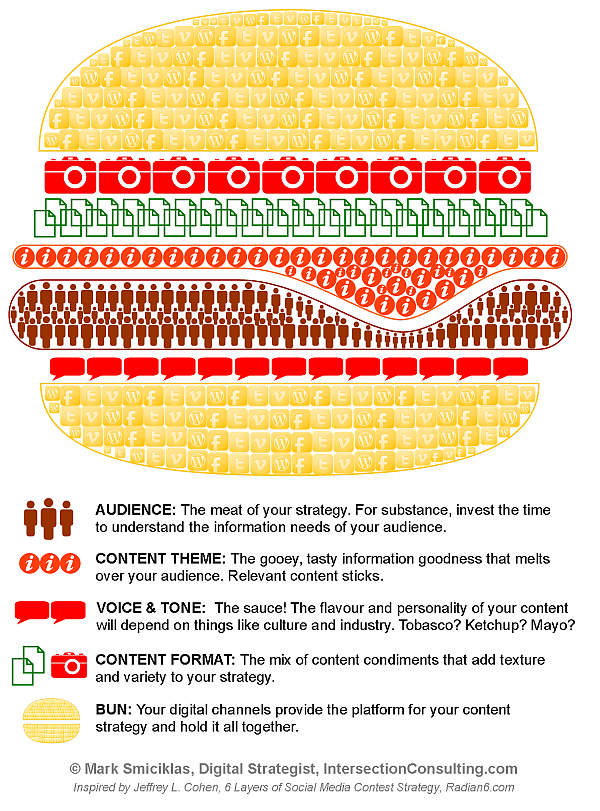
Content Strategy Grid – Infographic
Source – Eloqua
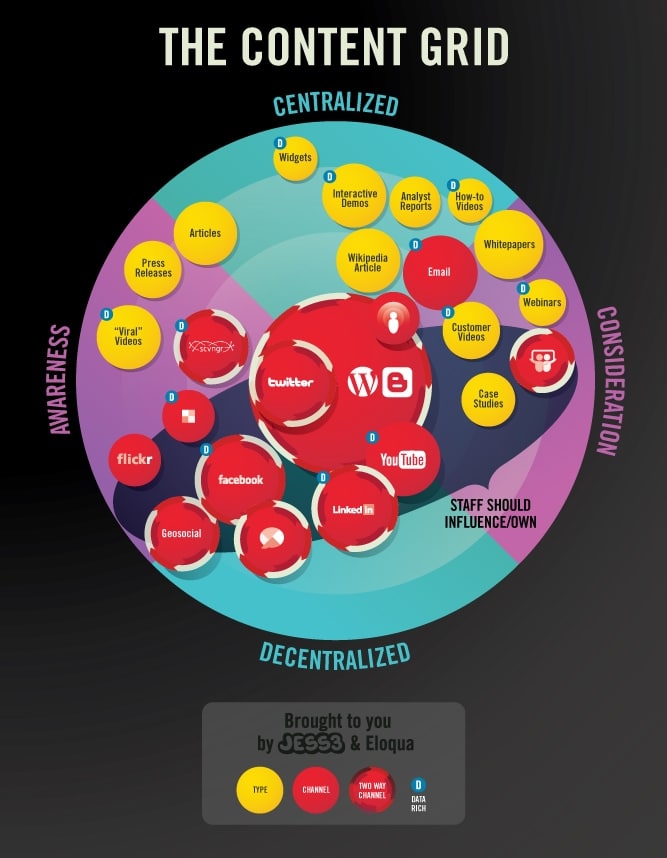
Now it’s time to recognize what your visitors want i.e. study what your visitors are searching for. And this is where we begin our third content strategy.
Research, research, research – Content itself is based on research. You need to know everything related to your products, which also include your competitors. Study how they are planning their content and what they are focusing on. However, the most important part of your study would be the phrases or the keywords that the browsers are searching for, while looking for products that you sell.
In general, you will have 3 categories of visitors – (i) the random visitors, who come to your site accidentally and they are mostly unlikely to become your buyers; (ii) visitors who are just browsing, they are the window shoppers and have no planning to buy though they can be your potential customers; (iii) finally the visitors who know what they want and where to find. The last category of visitors are the real buyers and include people who know exactly what they want and people who know approximately what they are looking for; however, the latter are yet to make the final buying decision.
As a content writer you need to research the keywords that all the 3 categories of visitors are searching for and consider the interest of all the categories of browsers while developing the content. The forth or the final strategy is to identify the keywords that most searcher and using and to do so you need certain online tools.
The online tools – There are several online tools, both free and paid that help to identify the searcher’s behaviors. The Google Analytics or any other web analytics can be the basic place to start with. They provide information about the keyword referrals, the bounce rates, and the most visited pages. Now start with the keyword referral data and make a list of all the keyword referrals. Also consider the bounce rate; the pages with higher bounce rate definitely need a makeover based on the keyword referral data.
Additionally, use the Keyword Research Tools – you can use Google’s Adwords or other online keyword research tools like ubersuggest. Give special emphasis on the long tail keywords that show the intention of the visitors and develop content accordingly to attract the visitors as well as to decrease the bounce rates. The result would also include more satisfied visitors and higher number of page views.
Flavours of content strategy [Infographic] (Rough)
Source – Richard Jingram
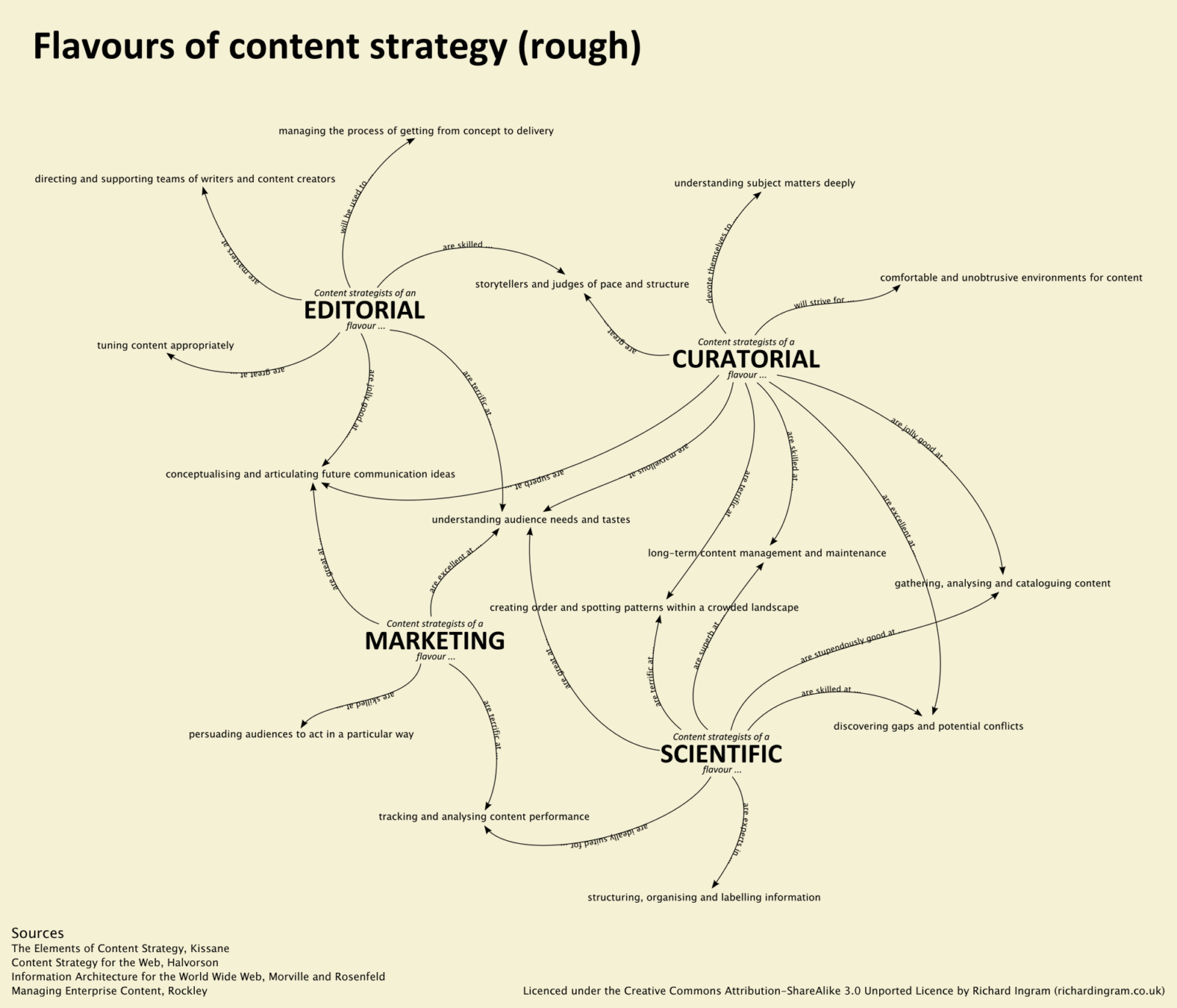
Infographic – Why content for SEO
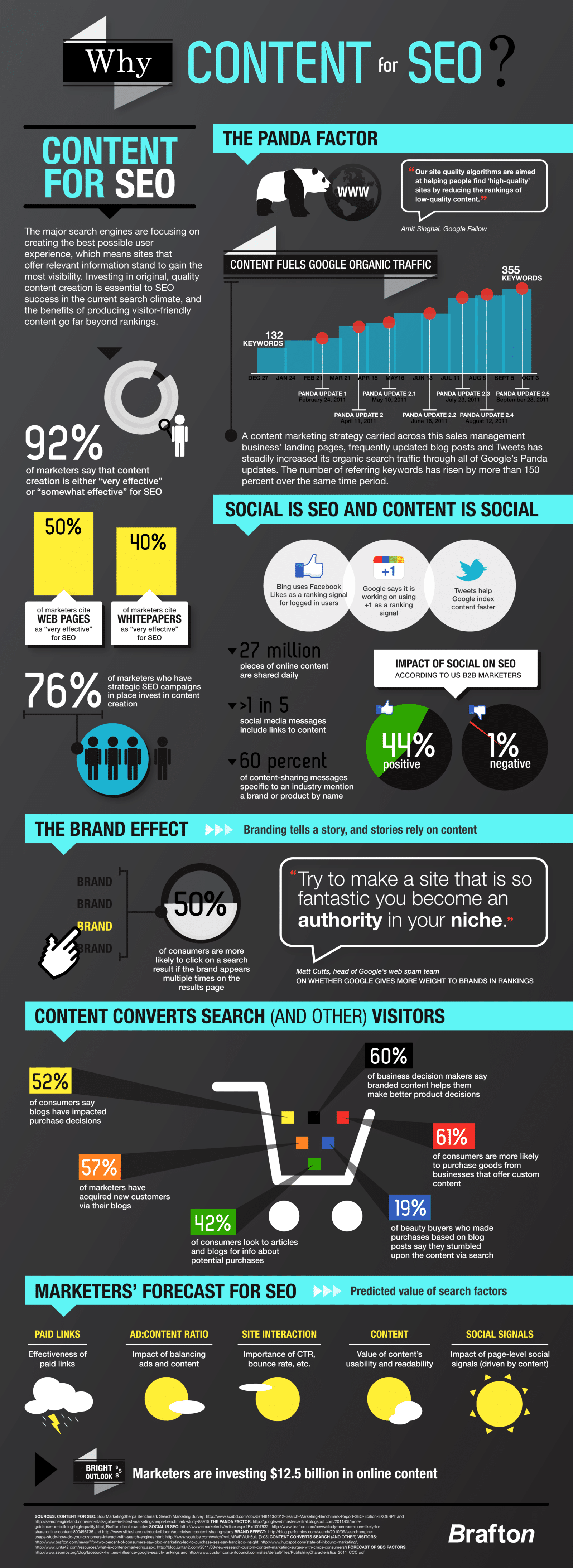
You should also read
- What is Content Curation
- Why You Need To Curate Content
- How to repurpose or recycle content
- Why do You Need an Efficient Content Management System
Content Writing Hurdles You Need to Overcome

The recent changes in search engine algorithms and other modifications have finally let out the gospel: content is everything in online marketing! If you don’t have great content, you are poor as an internet marketing unit. That is why most SEO firms, that had till date ignored content or depended heavily on content farming, are now serious about content marketing. But can you really start cranking out killer content overnight? It is easier said than done! You need a complete plan before you begin to work your way up the content marketing chart.
Most content written for the websites fail because they are too full of themselves. A brand is only interested in writing about its products and services. It is not prepared to spend time on what their consumers want to read. That is complete hara-kiri in the context of content marketing. Consumers are highly repelled by proud boasts about features, services and the likes. They want to read how these features will make life easier for them. They want to know what they will gain from your brand. Write about that and you will have readers flocking to your web page.
Ideas run a content marketing department. Most content writing teams write in isolation, with each writer doing their bit and leaving the bigger picture to sort itself out. That has got to stop! You have to coordinate and write as a team. Brainstorming sessions are part of any content writing team and if you are not having them every day, you are doing something wrong. Pool your ideas together so that you have a content schedule in place. Another advantage of this approach is that you will never run dry of topics to write about.
Great content is a product of these brainstorming sessions and ideation. Look up websites that are doing well in terms of content. There are content writing lessons lying around even in websites with shabby writing. In those websites, you can learn what not to write! Finally, ask for feedback from your peers and readers. It is only natural that writers have an ego that refuses to back down and admit that their work was incompetent. But you have to adopt an open mind and attune your writing to the demands of online content writing.
Content Writing: Factors of Liking and Reciprocity

Content writing has come to the forefront of online marketing like never before. So, the onus of looking after the various aspects of customer relationship lies with the copies generated by the content writer. Their job is not limited to churning out marketing copies to grab eyeballs. They also have to look after the subtle aspects like building and nurturing the brand or the company’s relationship with the client.
How much do your customers like your brand? Do they reciprocate the relationship building overtures from your end? These are questions that the content writing department has to worry about.
These are the days of fluid brand loyalties. A more attractive offer or a larger discount is always around the corner for the customers to be tempted. You need more than discounts and freebies to keep customers glued to your brand. You have to build up the factors of liking and reciprocity. By liking we mean that you have to endear yourself to your customers.
Imagine a situation where you are providing excellent customer service and informative content to your customers, along with solutions to their problems related to your products and services.
Juxtapose this situation with one where you don’t know what your customers want and keep publishing content that they don’t care a fig about. The former is how you develop liking about your brand among your customers.
Now we come to the factor of reciprocity. This is where you offer what the customers want through your content dissemination on your blog and social media updates. Your customers do not want to know about the big product launch that you have slotted in a week’s time. Instead, they want to know how that new product is going to make their life easier and simpler! Make your content writing focus on your customers’ needs and demands, rather than your own.
When you give them what they want, they will feel obliged to reciprocate your good gestures by positive word of mouth publicity and content sharing in their personal circles. In this way, you will find it possible to reach out to more potential customers with your web content. The factor of reciprocity will have a huge impact on how many people read your online material.
Getting Content Basics Right
With the right kind of planning and doing so in advance with a clear-cut objective will help you roll off content with ease. Look at some of the ways here.

What are the best practices that you need to follow in order to ensure that you have a steady content flow for your online marketing and SEO? The key to cracking this riddle is made up of three ingredients: planning, planning and more planning! With the right kind of planning and doing so in advance with a clear-cut objective will help you roll off content with ease. Look at some of the ways in which you can plan for your content flow:
Topic Farming
Hunt for topics well before you get down to the task of writing. The topic list must be ready to hand so that you internalize the matter that you are going to deal with in due course. That will help you become familiar with the topics and also give you sufficient time to conduct thorough researches. For the sake of variety, not just for the readers but also you as a writer, look for different domains that you need to cover.
Editorial Chart
The editorial chart deals with the calendar of your content. This calendar is essential to schedule your content according to your need. Content scheduling is the best way to keep the content flow steady. Your deadlines do not mean to be flexible because you set them! Stick to your editorial chart with topics and dates etched on it.
Writing and Promotion:
It is not enough to write quality content anymore. You have to back it up with active online promotion. There are so many platforms to promote and market your content. If you include the social media networks, your arena of operation becomes wider. Also, if you come up with excellent content, you can depend upon your readers to share your content with their friends and family.
Monitoring:
This last step is as important as the ones that preceded it! Monitoring the response to your content is necessary to know that you are on the right track. You can read the comments made by readers on your blog post or article. Take them seriously. Comment back and ask for suggestions. Use your social profiles to ask for feedback and also opinions about what kind of writing they want to read. Incorporate these suggestions and feedback into your editorial chart.
Read about how to write excellent newsletter
10X Content
Read about 10X content – What, Why & How
Do-it-Now Tips to Writing Effective Web Content

There is no dearth of articles and blog posts dealing with this topic! But no matter how much you read about them, it all comes down to how you are implementing them to actually write a copy. It is important that you come up with a post that actually follows these tips that you learn. In this post, we will try to help you in writing a post while we guide you through the process! So, instead of just reading this post through, open up a writing document and write a post as you read this. Let’s begin!
Suitable Title
First, think of a suitable title. Don’t rush on this. Think carefully and while doing so, try to incorporate your main keyword in the scheme of things. Most web copies are sold or rejected on the strength of the title or headline alone. There are so many copies out there fighting for the reader’s attention. You have to break through all that clutter and register an impression. At the same time, you title must encapsulate the post that you are going to write. Read about how to write effective SEO title tags?
Add Synopsis
Now that you have written a title, sit back and draft a synopsis of what you are going to write. You have to come up with content that is not just engaging and interesting, but also informative. There must be some take-away from your content. The reader must get the worth of their time and effort that they invest in reading your copy. Do not think of keywords now. Instead, write a copy as you would talk to a friend. There’s nothing like packing in an anecdote here and there, if it is relevant.
Avoid Jargons & Don’t overdo keywords
Avoid excessive emphasis on keywords and jargons. Readers do not care about terms that mean everything to you! You have to decode these terms so that laymen understand what you are talking about. Keep your marketing messages subtle and well wrapped.
Nothing must jut out like a weedy stub. The writing must flow naturally and organically from Point A to Point B. Pack in the message within the fabric. You can draft a persuasive web copy without going overboard with the marketing punch lines. It requires some practice. Go ahead, write it out!
Writing Targeted Web Copies for your Customers
Once you have identified the consumer group, your web copies must be written exclusively with these consumers in mind .

Web copies are written with an objective in mind for them to be successful. The objective usually means a consumer group that you know to be responsive to the kind of products or services that you offer them. For example, if you sell mobile phones that are trendy in design with lots of social media functions, you know that the young brigade is more likely to take an instant liking to your product. Once you have identified the consumer group, your web copies must be written exclusively with these consumers in mind. That is the only way in which your web copy will be able to fulfill its purpose.
It is often noted that web copies dabble in highly technical matters related to the domain of business you are in. The ghost writers on your team crank out a well-written article on some finer technical detail that will be of great interest to people in your domain of work.
For common consumers, such technicalities are a burden that they will shrug off at the slightest opportunity. In other words, despite all the effort that you invest in getting such a scholarly web copy off to the press, it fails to get you any readership. It does not even engage with your consumer group! When such web copies are written by your team, send them off to channels that cater to specialized professionals in your business. Do not dish it out to the buying public.
For people who buy your products or services, you need to interpret those technicalities for them to understand why they need a particular product. Instead of telling them how the car you manufacture gives you lesser mileage, tell your consumers how much dough they save in the process. That is more up the alley of common buyers.
They want to know what you have in your product to make them life easier. They are not interested in the innards of the product and how trend-setting the technology is! So, the next time you write a web copy for the business to consumer (B2C) domain, make sure you don’t go all high on technical details. Keep your target readers in mind and write something that you would like to read as a layman reader.
Conclude with a call to action
End your copy with a call to action: to make a click, visit the next page or simply ‘share’ your content with other readers. This is essential to bring your web copy to a fruitful conclusion.
SEO copywriting tips
SEO copy writing tips to create the best quality content. Smart and quality content is the most important way to improve the performance of your site on search.

Creating the best quality content is the only way to improve the performance of your site in the major search engines. To determine the relevancy of a page for a given query, Google algorithm uses more than 100 parameters. And that’s where the importance of SEO copywriting comes in – you need to learn the art of writing search engine friendly content, which will also help you to get more number of back-links for your website. This includes the frequency of keywords and title length as well.
The following are some tips that will help you to write a killer content for your site:
The online readers hardly read pages they just scan them. Therefore, you need to make your content interesting. Use language, layout, images and color to make the content look attractive. It must have a billboard style of design to attract the online readers.
And while doing so give special emphasis to your visuals including photographs, slidedecks, infographics, artwork, charts and graphs, and video. However, do not buy stock or steal images off from the web. Rather, add original media in the content. An original and interesting hand-written graph will attract more number of readers than using a free or paid image.
Headlines are equally important for a powerful SEO copywriting. Headlines make a promise to your readers. So make sure the headline is in sync with the body of the content. Also use the h1 tag for your content title; this will make Google and the other search engines take it extremely seriously.
However, make sure the same words that you are using in the title are also present in the body of the content. It helps the search engine to give more focus on the chosen keywords. In addition, use h2 tag on your sub-headings; if applicable, use h3 tag on the sub-sub-headings. Google and other search engines give respects to articles that are hierarchical.
Another powerful SEO copywriting tip is to cross-link your pages. It is a great way to share the PageRank among the articles on the website. This way, no page will outperform the others. While interlinking your pages use contextual links with relevant anchor text for the target page. In fact, it is a smart way to tell Google and other search engines what your pages are about, apart from spreading the PageRank over your websites.
In addition, provide links to useful sites. Google as well as other search engines give importance to pages with quality outbound links. However, the sites that you are providing links to must be relevant to the content of your page. Also, make sure that Google or other major search engines have not penalized those sites; otherwise, your page will be penalized as well.
Stop Writing Tips. Write About What You’ve Done

Have you ever read an article and thought, “Haven’t I read this somewhere before?” I know I have. If you’ve been in anywhere near online marketing for six months or longer you’ve probably read numerous versions of the same regurgitated marketing advice again and again. Feel free to nod your head if you’ve read something closely resembling these headlines in your RSS:
– Top 10 WordPress Plugins for Your Blog
– Forty Ways to Start Guest Posting
– The Best 7-Ways to Get Motivated in 2020
While posts like this continue being published across hundreds of marketing blogs, you’ve got to admit that “tips” articles get pretty stale after awhile. If you’re planning to publish an article, unless you’ve written something truly innovative you’ll probably be disappointed with the results you get. Fortunately, there’s a new way to create content actually requires less work and makes you look like more of an expert. It’s called writing about what you’ve done and it’s going to be a big part of my content marketing strategy.
Making the Switch
If you’ve been stuck in a rut writing “tip” themed articles in the past, it’s okay and I need you to know that it’s not your fault. After all, it’s what you’ve been taught to do from hundreds of marketing articles online. But when you think about it, is this really the type of content you as a reader invest your time consuming on a regular basis? Probably not if the style of content being consumed on the fastest growing blogs is any indicator.
Many of the most popular internet marketing blogs on the internet right now include SmartPassiveIncome.com, LifestyleBusinessPodcast.com, and YoungPrePro.com. Notice a trend in their content? The majority of the content is about stuff these entrepreneurs are actually doing. Often, all these blogs do is write about what they are in the process of accomplishing with their own business.
Why Writing About Your Experiences Works… And Why It’s Actually Easier Than What You’ve Been Doing
So why are people attracted to this form of content? For one, it’s easy to be unique when you write based on experience. If you decide to test something as mundane documenting how much traffic you receive from commenting on forums or blogs. This simple, low-cost test could be the start of a series of posts about your discovery of forum marketing or blog comment marketing. Just tell the story as it happened and you’ll probably find that some people are interested into it.
The second reason writing about something you’re experiencing is that it’s easier for people to connect to the real world. Yes, a tips article can be helpful to provide you with the five reasons I should include an email intake form on my blog. But there’s something about writing about an experience that you’ve actually tested, failed or succeeded at that can set you apart from other content creators.
Finally, believe it or not, writing about experiments or experiences that happen to you might actually be a lot easier than writing traditional advice posts that often require a lot of research. When you write about things you’ve done you can just document what you do, what you felt, or what your thought process was at the time of writing. And you don’t need to be the smartest guy in the room to get noticed for this type of content either. You just need to be yourself.
Creating Content to Get Traffic

Content serves a lot of purposes for an online marketer. It drives traffic to a site, helps to create a viral in the digital sphere, market product or service on the social networking sites, and last but not least, helps to earn the writer name and reorganization amongst the digital marketers. Millions of articles, blog posts, press releases and whitepapers are put up on websites on a regular basis. Unfortunately, most of them go unnoticed unless they can successfully gain the attention of a wide audience.
Thus, the first tip to get traffic through your site content is to create something that can attract the attention of the people, so that they invest time to read it. Better yet, make it interesting enough to encourage people to share it on social networks. This is one of the most pertinent moves for achieving juice passing links. The following are some more tips that will help you to create content to get more number of traffic as well as shares.
Create controversy.
Yes controversies provoke discussion, which in turn, help in making your content going viral all around the Internet. You must have seen your friends and followers sharing the same articles on Facebook or Twitter; the fact is, these articles were successful in provoking a discussion. And the best way to do it is by causing controversy. However, go easy with the topic and your flow of writing. Of course you have every right to pen down your opinion, but just don’t try to create a controversy for the sake of creating it. Your write-up will show the forced effort.
Share news (read top news).
When big story breaks on regarding any company or organization, Google is more than likely to show you the news articles in its search result when you type the name of the company or organization in the search query. And in most cases, these news articles get higher ranking than the company/ organization’s websites. Take your cue and start sharing news about your specific industry with your readers. Better yet, create a blog and start writing articles related to the news of the day. As more number of people is looking for such information, it will bring you both traffic and bring up your name in the search result.
Bring comic relief.
Take examples of websites like The Oatmeal or other humorous and jokes pages on the social networks. They are all over the Internet. People love gags, memes and are consistently seeking for entertainment. If you have noticed, you will find that most of the highly circulated content deals with media-rich comedic pieces. In fact, in the past year alone the memes have become so popular in the social networking sites, especially Facebook. The same applies for entertaining infographics. These are some serious tools for gaining more number of traffic.
Tips to Write SEO Content that Sells Ideas

The articles that you publish on article forums and directories for SEO purposes are usually meant to sell ideas. More often than not, you are talking about how to make use of certain products and services rather than about the products or services in themselves.
For example, if the company is selling perfume, the article writers crank out content on perfumes as a style statement and on these lines instead of writing about the perfume. This is very much similar to selling ideas as opposed to actual products or services. I’m listing some tips to be better at this kind of content writing:
Perspective:
The perspective of the content writer is of utmost importance. You need to write from the point of view of a user. What is it that they want to know? If you think by placing yourself in their shoes, you will come up with content that is interesting and engaging. That is half the battle won for you! Having the right perspective will also help you choose the right topics and then develop the narrative of the article.
Lucidity:
Ideas need to be sold in a simple manner. If you complicate the process of selling an idea, it gets lost in the complexity of your written narrative. As an example, pick up any TV ad that sold you an idea successfully. What do you remember most about this ad? The fact that it told you something with simplicity! That is what creates the strongest impact. While writing content to sell ideas, keep them lucid, direct and precise.
Keyword Factor:
SEO executives will insist on you following keyword density limits and other keyword-related issues. Dump them from your mind when you are writing content. Keyword-concentric articles are never well-written because your focus shifts from writing good content to writing keyword-rich content. That is the death of the article! Instead, write naturally and let the keywords fall in place organically.
Variety:
Bring variety in your choice of topics. Writing about the same point in article after another is self-defeating. It only swells up the volume or number of articles that you submit every day. It does nothing for your idea-selling goal, the primary objective for which you are developing content. Variety will spice up proceedings not just for your readers but also for you as a writer.
Is your content of any value?
How to create value in your content?

Internet marketers trying out their hand in content marketing keep asking themselves this question. Is the content that they are publishing of any substantial value? Does the content add value to the brand or hike up online sales? Is the quality of content totally detached from its aesthetic appeal? These are some questions, which can put any internet marketer to the test. In this post, we will look at some metrics that determine the value of content.
For example, the number of social mentions, or the number of times your content is shared on the social media networks, gives you a fair idea of how your content is received by online readers. The social mention metric also tells you if your content is of sound literary quality. No online user will share or promote your blog or article online if they don’t enjoy reading it. What better measure of your content’s aesthetic value than knowing how many people appreciate it?
There is something called attribute modeling. In very simple, layman terms, it is finding out the number of visitors that come from certain sources or points of content dissemination. For example, you publish a blog on a high-profile website. Use Google Analytics to track down the number of visitors to your website that have clicked on the web links provided in that blog.
That way, you know how many readers you have successfully influenced enough to make them click. Attribute modeling will help you zero in on posts, blog or articles, that have found favor among online readers.
A time-tested metric to measure the value of content is to check how many links it has earned. If your content does not attract any link building invites, do not automatically conclude that your content is of no value! There might be other reasons why the invites didn’t come rolling.
However, when you find link invites coming your way for a content piece, you should pat yourself on the back for having written and published it! Similarly, comments that users and readers leave on your blog post or article can be helpful in measuring the value of content. A blog post that has received many readers but zero comments usually mean that your content has excellent attracting power, but little retentive or enticing quality.
Does Your Content Have What it Takes?
In the world where there are more content being pushed to the sidelines than the ones being read, you need to stay ahead of the curve to be visible. There are so many tips and tricks doing the rounds, offering you invincible ideas on getting your content to stick. Many of the tricks work while some don’t. In this blog, too, you will find some content marketing ideas that you would want to know and implement. In this post, however, we are giving you a checklist that you need to measure your content.
Element of unexpectedness
For example, does your content have an element of unexpectedness? Writing what the user will expect from your desk will not be interesting or readable by any stretch of the imagination. You may be an authority on SEO, so people expect the routine SEO tips from your side.
How about surprising them all by debunking a myth that most SEO professionals religiously follow and offer a quirky but effective alternative? That will surely spice things up, not just in that post but also elevate your value in the perception of your readers. Your blog instantly wins over a reader!
Simple ideas in a simple manner
Another great way to do that is to write about simple ideas in a simple manner. There are too many pundits and experts muddling things up for everybody! Why not simplify them and break them down in easily digestible bites? That will ensure that your online reader’s attention span is not tested and they get the message you are trying to convey.
The idea is to ensure that your ideas sound and look simple. To achieve that, cut down on the jargon. Dump the long sentences and convoluted concepts. Try explaining it to someone you know. If the message gets home, use the same tact and voice to write the post.
Concreteness and Conciseness
No one cares for generalizations anymore. If you want your content to hit the bull’s eye, or Google’s eye, get two important Cs into the mix: Concreteness and Conciseness. Your posts must be to the point and underline your message without being preachy. Don’t look at the word count. Write what you want to say and then publish it. That will take care of the post’s length. And back your facts with figures and stats, wherever applicable.
Try these out and let us know the results!
Related Tutorials:








Unlike other resources This one offers posts that is actually useful. Keep up thegood work. Thanks
Thank you
I am completely agreed with you about this post of content writing, the article was beneficial and increased my knowledge in a field of content writing.
Thank you Simon
Keyword density matters a lot in case of google crawling. We should not do keyword stuffing . Use keywords in limit.
Thank you Pulkit
Good post. I use bullet points in almost every post I make. I think they are a great tool for dividing your points up in a logical and digestible manner. They are well suited to blogging because the typical length of a post being around 500 words. I tend to have a hundred or so words of introduction, scene setting etc. I can the use bullets to enumerate a few points around the subject before summarising at the bottom.
Thank you Gary :)
Thanks mate, for sharing such tips with us,
and i believe you are also writing some great compelling posts thats the reason i commeneted here! :)
Cheers
Hope to see you on my blog tooo!
Thanks Sharma. Sure I would check your blog too
Nice post. Very useful tips. Yes a proper writing schedule and deciding on topics beforehand helps a lot. Thank you
Thank you Debjani
Wow! I love these infographics. When you start an online business, the most important thing is ensuring not only its growth but also its success. What most people do not keep in mind is that the success or the failure of a business depends on their web content as well as the promotional content that they have. If you are a business owner, you should always contemplate the impact that content writing could have on your business.
Thank you Richard. Yes I agree, fresh & quality content is very important for the success of online business.
The implementation of “stop words” is vital to creating keyphrase dense web copy without coming off as spammy. Good write-up.
Thank you Guy
Nice post about headline. I agree with that good and attractive headline always impress the people. You also explain some good points about it. Thanks for sharing this informative post. Really appreciated.
Thank you
I used to try the idea of creating controversies. But once i got into big trouble. So readers, take a little care of others feeling when creating controversies. Just a tip from an experienced person.
Thank you Sreedev for sharing your experience. Yes controversies are very good traffic fetchers but we need to be very careful while crafting the controversial content effectively looking into legal, social & emotional aspect of it.
hey Debajyoti Banerjee,
thanks for the awesome copy writing tips, as currently iam practicing well to be a great seo copy writer and all the tips above mentioned are wonderful.
Thank you Rajkumar. Best wishes.
This is spot on, Deba! Writing about what is happening/I'm doing has been very effective for me; not only does it result in more quality traffic and time spent on site, it also strengthens readers' loyalty and trust in you.
Thank you
I’m truly enjoying the design and layout of your site. It’s a very easy on the eyes which makes it much more enjoyable for me to come here and visit more often.
Did you hire out a designer to create your theme?
Exceptional work!
Thank you Adrian. We have made it in-house.
Great tips
Content must be relatable and actionable in order to increase user attention. When you write content you should never forget your reader there’s a real person reading your content, not just some mysterious abstract being.
Thank you Lisa
Wow, I mean I am glad that I came across your article. I can see your hard work behind composing such an in-depth and insightful article. You really explained everything too well. The infographics used in this article are amazing as well. Really, you did an amazing job. Your readers will surely appreciate you for sharing the same. Keep spreading goodness with your articles :)
Thank you
I’ve learned something good from this blog. The information provided is great and helpful. Thanks for sharing.
Thank you Ranjeet
Thank you for such giving out such helpful tips. I hope this article will improve my website copywritng and other content writing skills.
Thank you Harry for your feedback. Hope you will apply these content writing tips to your website. All the best.
In-depth, thorough, well researched! Your article never stops to amaze me.
Creating original content – as evident, it may seem, many people ignore this fact and are just copying others’ work or getting very much inspired by others’ work. It is terrible in terms of Google punishment and the people’s point of view. If someone is writing original content and follow your strategies, he is bound to get rewarded for his hard work
Thanks Garry. Yes relevant & original well researched content with value always pays off
The informations provided here are well described and very useful for any kind of content writing. Personally, it really helps me to understand the nuances of content writing and apply it on a daily basis.
Thanks, for providing such amazing tips. Hope it will help a lot of people to get better at content writing just like me.
Thank you Sukanya for your encouraging comment about our Content Writing Guide.
A wonderful article.
I go through with this article and I really enjoyed it, I appreciate your skills and ideas. waiting for such more helpful articles, keep sharing.
Blogging is the best career nowadays. Because of the pandemic, most entrepreneurs turn their businesses and industries online. So, you’ve already plenty of organic audiences to engage.
Hey Debajyoti,
This is by far one of the most insightful posts on content writing. Hats-off for the amount of research you have put in. The graphics are quite impressive.
Hi, I was always afraid about how I would be able to write content but after reading your article now I feel that I can write good content for blogs.
Thank you for sharing such helpful information. I hope it will assist many individuals, including myself, improve their article writing skills.
Thank you Rishika. Also you can use AI writers for speed up your writing and to get good starting ideas. AI content writing Tools like localio.io, jasper, writesonic are good.
Genuinely great article. It is often thought that people today prefer short posts, but this is not true! The fact is that people are still looking for real information and are ready to read more. The purpose is to provide information because visitors will only read the parts they need! I learned this when I decided to invest in the services of the best content creation agency in Lucknow, Half Circle Media
Wow plenty of good knowledge.